Sep 7, 2025 – 2nd 10,000-Day Practice, 1-10th 100-Day Prayer Opening Ceremony, Gyeongnam Division Members’ Day
Hello. Today marks the opening ceremony for a new 100-day period. Since beginning the 2nd 10,000-Day Practice, we are now welcoming our 10th 100-day period.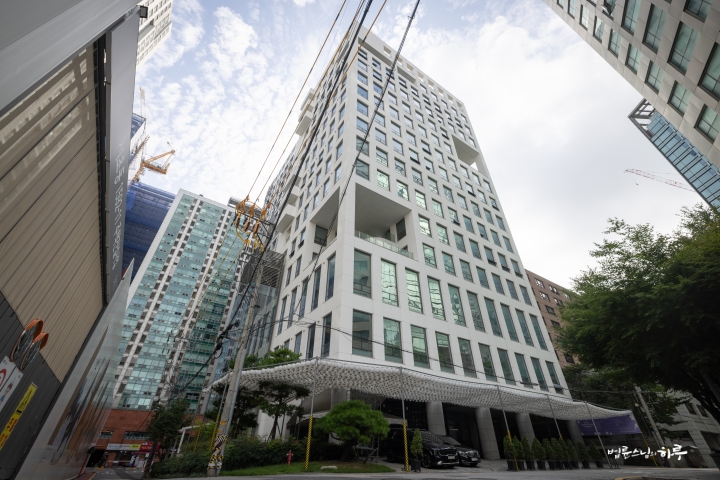
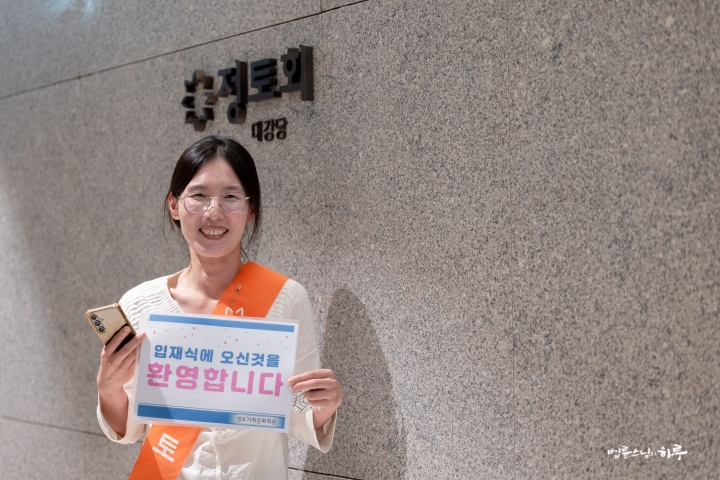
At 9:30 AM, the opening ceremony began with the ringing of the bell. The underground auditorium of the Jungto Social and Cultural Center was filled with over 400 members from the Gyeongnam Division who had departed at 2:30 AM, along with about 80 members from the community divisions.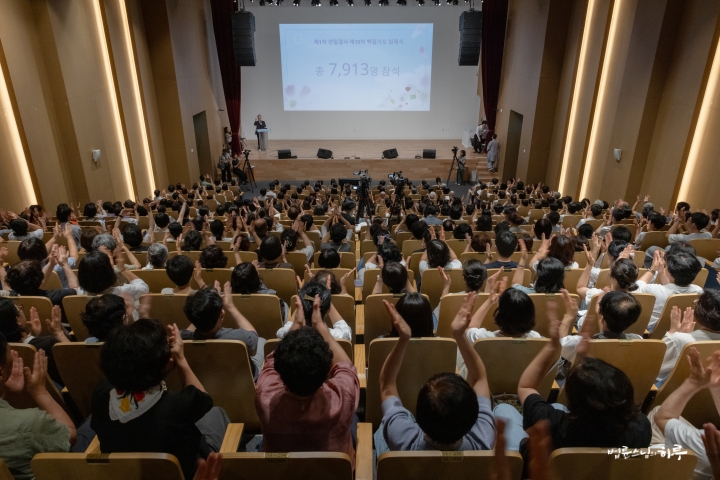
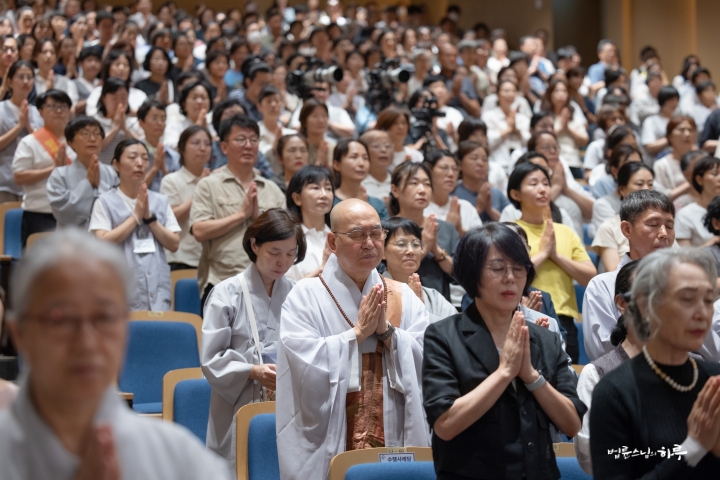
After the bell ringing, Buddhist service, and recitation of the Heart Sutra, the 10th 100-Day Prayer opening ceremony began with an energetic greeting from the MC, Mr. Kim Byeong-jo.
“A world where individuals are happy, society is peaceful, and nature is beautiful is called a Pure Land, or Jungto. The 10,000-Day Practice began with a great vow to overcome all suffering in this world and realize pure minds, good friends, and clean land right here on earth! Welcome, Jungto practitioners, to the 2nd 10,000-Day Practice, 1st 1000-Day Practice, 10th 100-Day Prayer Opening Ceremony!”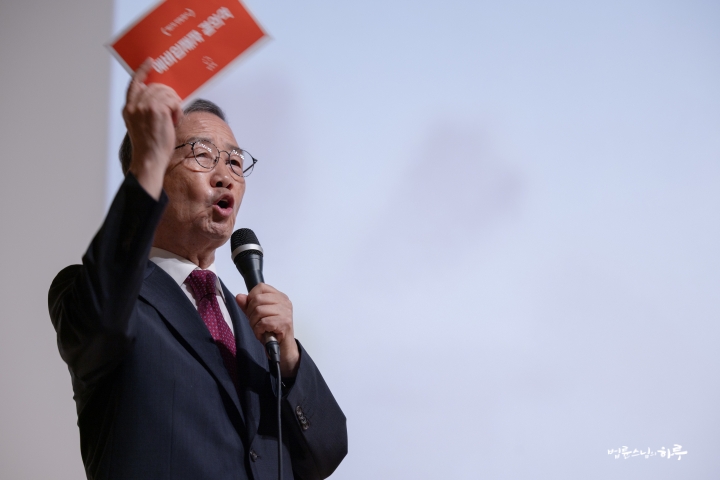
After 100 days, Jungto Society members gathered together once again. Just as the 24 solar terms marking seasonal changes guide farming activities, the 100-Day Prayer opening ceremony serves as a precious milestone that allows us to reflect on how deeply our practice has developed.
With 7,900 people connected to the live broadcast from home and abroad, the opening ceremony began with great applause, celebrating the gathering of Jungto practitioners in one place.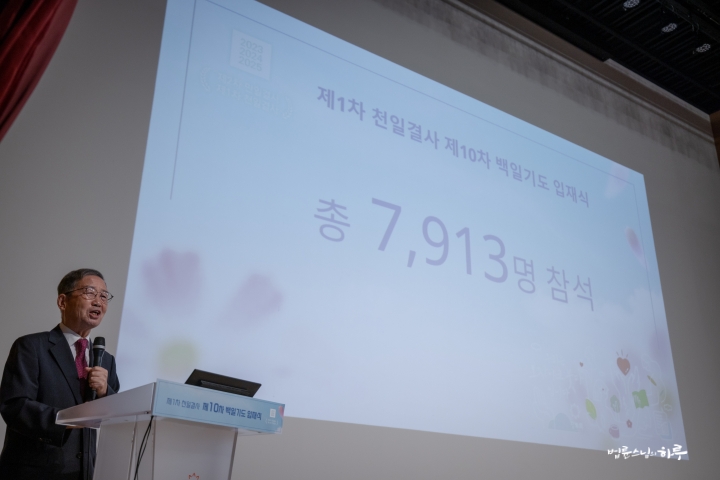
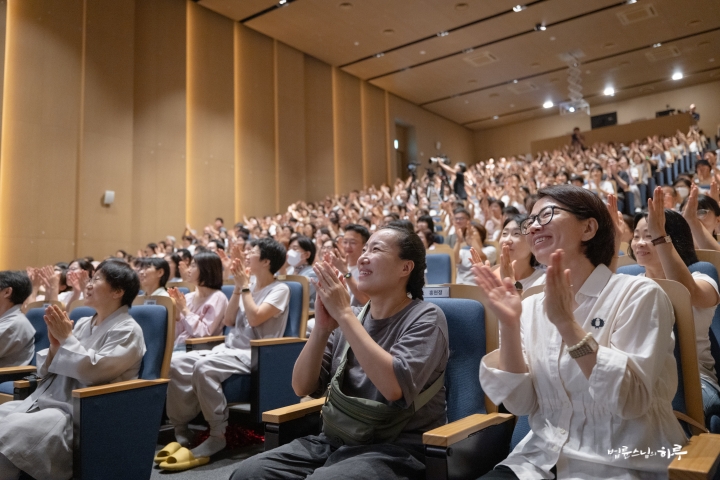
First, the 9th 100-Day Prayer closing ceremony was held. Following greetings from the President of Jungto Society, a video showcased the footsteps of the past 100 days. Many activities from around the world were captured in a 15-minute video.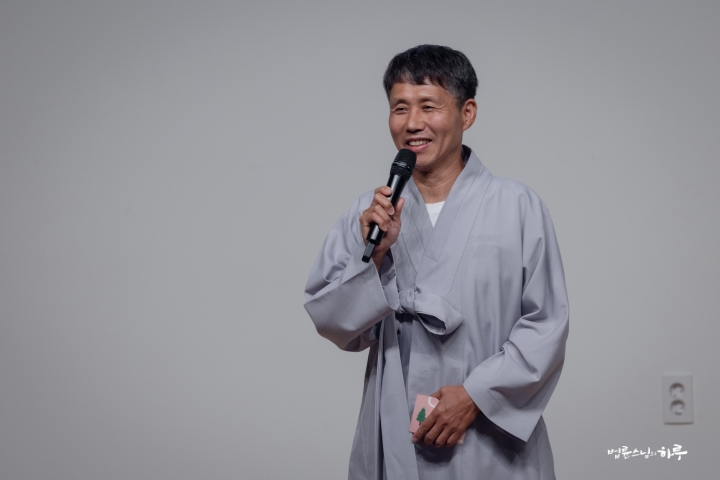
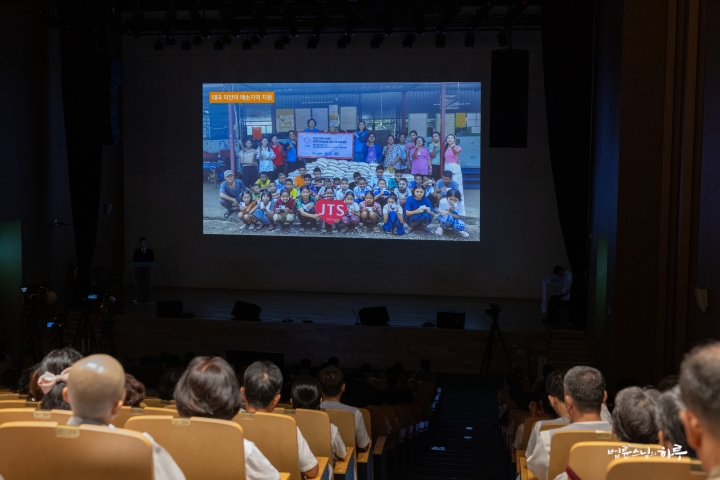
Next, we heard a practice testimony from Lee Jae-hee of the Nowon Branch, Seoul-Jeju Division, who practiced more diligently than anyone over the past 100 days.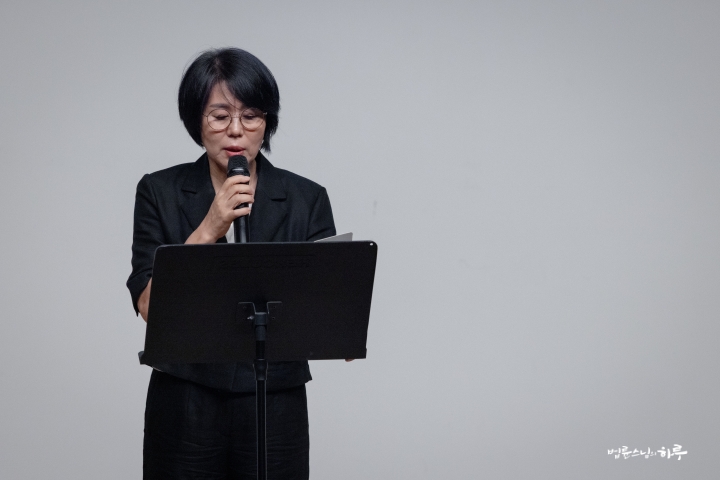
“When my son suffered brain damage in a traffic accident and was at the crossroads of life and death, I did nothing but prostrations in the hospital corridor until the surgery was over. With the desperate feeling that ‘this alone can save me and my son,’ I prayed and vaguely realized in that moment that letting go of myself is practice.
The Prostrations That Saved My Son, The Practice That Saved Me
I never let go of practice during three years of hospital life. While leaving my son in the ICU to attend meditation retreats, I controlled my mind through breathing. Working during the day and caring for my son at the hospital at night, I never let go of practice and volunteer work. That strength allowed me to face reality even in chaos. Every dawn, I laid out a cushion in the hospital lounge and practiced diligently. Tears flowed when I went to the Dharma center to strike the moktak wooden instrument, but that time was a long journey of finding myself. The strength to accept my son as he is came from practice and volunteer work. When my son was hospitalized due to the accident, all Dharma assemblies had moved online due to COVID, allowing me to continue my duties beside my child. My connection with Jungto Society, which could have been severed, actually deepened. I learned that not everything in the world is necessarily bad.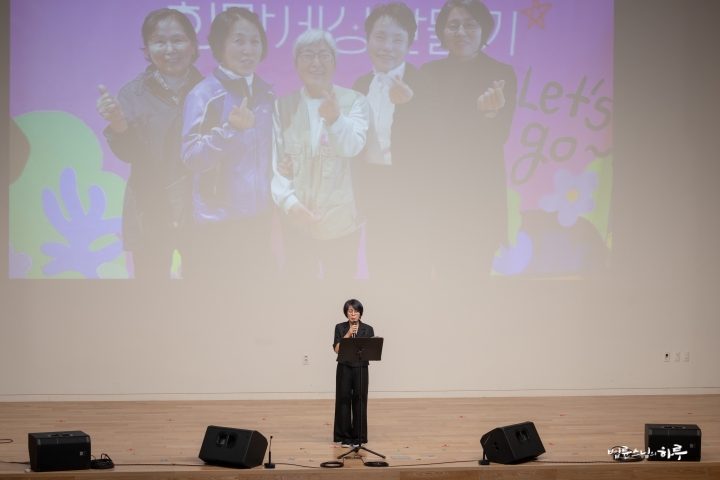
Even now, when voices rise between my son and husband in the living room, I first prostrate myself. When I calm my mind first, it becomes quiet shortly after. Practice has brought me peace. I am tranquil because I don’t argue with what has already happened. By recognizing suffering, listening to Sunim’s Dharma talks, and sharing with fellow practitioners, I have lived on. I will continue to share the happiness gained through the unity of work and practice not only with my family but with those who need it. It’s all thanks to encountering the Buddha’s Dharma. Thank you.”
While listening to the story, people could be seen wiping tears with handkerchiefs here and there in the audience. It was a time to deeply feel what practice truly means.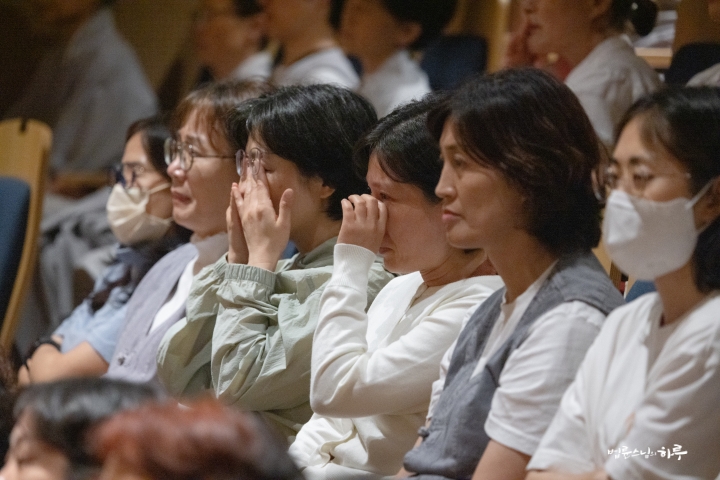
Next, we invited Venerable Pomnyun Sunim, the guiding Dharma teacher of Jungto Society, to give a closing Dharma talk for the 9th 100-Day Prayer of the 1st 1000-Day Practice. Looking back on the past 100 days, Sunim pointed out both the path South Korea should take amid rapidly changing international circumstances and the points individuals should reflect on in their practice.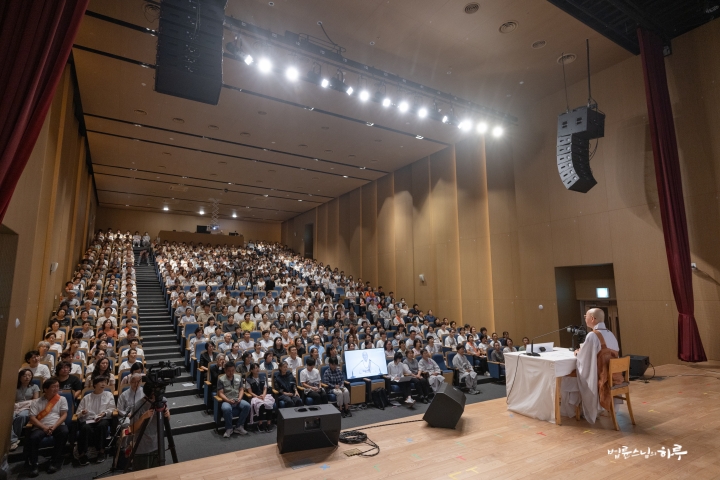
“Last spring, as we began the 8th 100-Day Prayer, Jungto Society entered a 300-day special practice period starting with the 100-Day Dharma Talk. This special practice was not only for the mind study and practice of Jungto practitioners but also part of our prayers hoping that Korean society, which had been in turmoil due to the December 3rd emergency martial law, would quickly regain stability. In the human world, there isn’t only the world we see, hear, and know. Because there exists a flow in the invisible world, we engaged in this special practice hoping our sincere devotion and prayers would help stabilize the government even a little. While the high democratic civic consciousness of the Korean people played the biggest role in restoring governmental stability, I believe the devotion of Jungto practitioners also contributed a small force.
Cooperation, Not Division: The Path South Korea Must Take
After the 8th 100-Day Prayer ended, the 9th 100-Day Prayer began in June. Despite various confusions after the new government took office, the administration seems to be proceeding without major problems so far. The response to U.S. tariff pressure, which was the biggest challenge, also seems to have passed without major issues so far, though we cannot yet know the final outcome. However, yesterday in Georgia, USA, there was an unfortunate incident where about 300 of our citizens were arrested due to visa issues for Korean company workers. This shows that while Korea-U.S. relations may be solid in terms of security, economic conflicts will not be easily resolved. 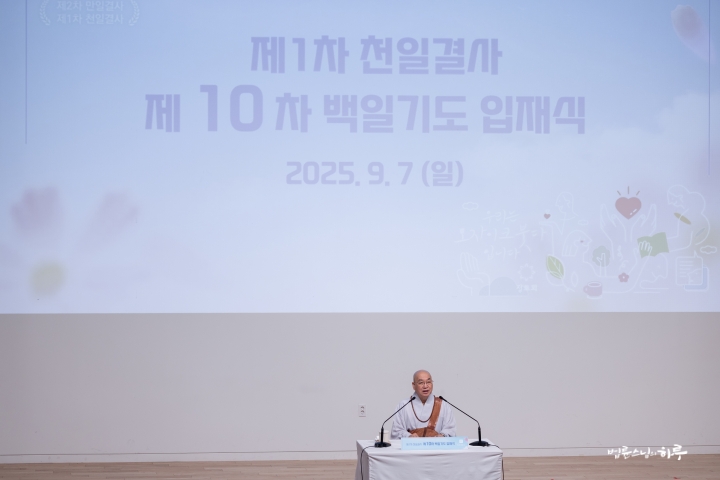
Last week, at China’s World War II victory commemoration, leaders from 26 countries attended, including the leaders of Russia and North Korea. You must have seen the treatment the North Korean leader received in China. Despite being one of the poorest and smallest countries in the world, seeing them treated as equals with major powers, and comparing it to the treatment of the South Korean president visiting the United States, gave a somewhat wounded sense of pride. While the Republic of Korea has talented citizens, a solid economy, and significant cultural influence through the Korean Wave, it is true that we still lack in diplomacy and political power. In the reality where we must live with our heads bowed due to lack of power, we sometimes feel a sense of servility in our hearts. If the South and North could leverage each other’s strengths, combining South Korea’s talent and prosperity with North Korea’s national pride, our people could have greater self-esteem.
The world is changing rapidly. In this situation, whether our nation will rush toward North-South confrontation and repeat the tragedy of fratricide, or whether we will not repeat past misfortunes and cooperate to protect each other’s interests in the international situation, will be an important task that will determine the next 10 to 20 years. Facing this challenge, domestic politicians should seek solutions through cooperation between the ruling and opposition parties and between progressives and conservatives. However, seeing one side wielding swords in the name of eradicating insurrection while the other side resists without even accepting the Constitutional Court’s decisions, it reminds me of the parable of the burning house where children play with toys, unaware that their house is on fire. It’s regrettable to see the reality of being buried only in domestic issues while great dangers approach from outside.
Nevertheless, this is reality. As stated in the Constitution, the owners of our country are not a few politicians but all citizens. Therefore, it is not right to blame only specific politicians when the country goes wrong. In the past, when the king was the owner of the country, we could hold the king responsible for wrongdoings. However, now that we have chosen a democratic republic, the citizens are the owners. If the country goes wrong, all citizens must take responsibility together. In that sense, we should not insist only on our own thoughts but have an attitude of embracing others even when we have different views and religions. 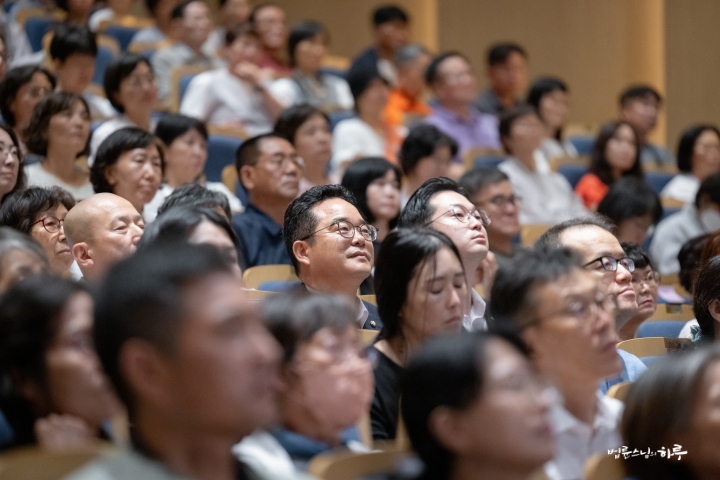
The next 100 days mark the final 100 days of Jungto Society’s first 1000-Day Practice. At the same time, from a national perspective, this period will determine whether we move toward peace or confrontation between North and South Korea. If dialogue between North Korea and the United States, as well as between North and South Korea begins, a window of opportunity may open to overcome the crisis. However, if confrontation continues and military cooperation between South Korea, the U.S., and Japan versus North Korea, China, and Russia strengthens, the division of the Korean Peninsula may persist and the risk of power clashes may increase. The current situation resembles the circumstances that led to the Korean War during the post-World War II power restructuring centered around the Soviet Union and the United States. In such times, politicians must wisely overcome national crises. Citizens should not only pursue personal interests but also support the government’s correct policies. They must also know how to criticize wrong policies. As religious practitioners, Jungto practitioners should consistently pray for the nation, seeking not only human strength but also the power of Buddhas and Bodhisattvas. This 100-day period concludes Jungto Society’s past three years and is a crucial time for our country’s stability in the international community. Therefore, I hope all of you will have a heart that prays for the nation and its people, transcending the success or failure of any particular political party or government.
Living a Life of Self-Respect
As we saw in the footsteps of the previous 100 days, each and every one of you has carried out many activities in your respective positions. Among these, the most important thing is to live happily without suffering. A single living person is more precious than the entire world. Therefore, just as we respect others, we must also respect ourselves. Collapsing drunk on the street or screaming in rage happens because we don’t respect ourselves. Being unable to sleep due to suffering, hating someone, or trying to take one’s own life also stems from not loving oneself. 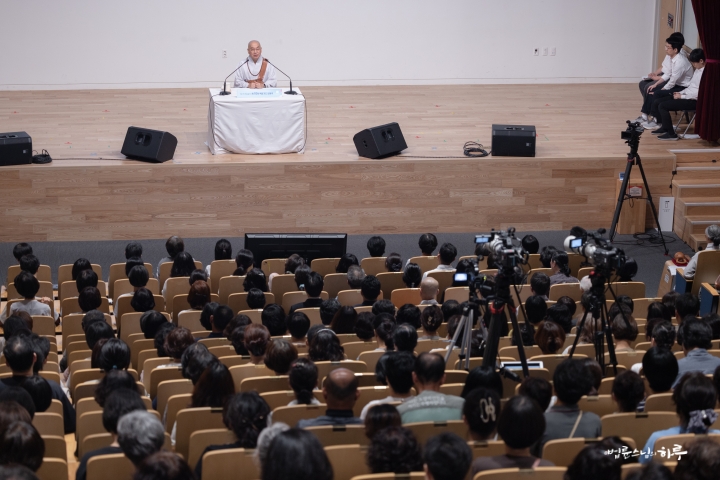
People cannot obtain everything they want after being born, nor can they fulfill all their family’s expectations. This is because while our abilities are finite, our desires are infinite. It’s not that we lack ability, but that our desires are excessive, preventing us from achieving everything we want. We must realize it’s not due to lack of ability and learn to moderate our desires. Even rabbits and squirrels in the forest live well in their own way, so there’s no reason humans cannot live well. Thinking we cannot live is like evaluating ourselves as inferior to squirrels or rabbits.
It’s fine to live alone, fine to live with someone, and fine to separate after living together. We need to have the mindset that it’s fine whether our desires are fulfilled or not. Looking back after about 20 years, what we ate for lunch today, whom we met, or who our friends were at the time won’t matter much. Though it feels important now, it won’t be significant when we look back. Therefore, we need an attitude of doing our best in the present without being attached to results. As the old saying goes, “People do the work, but Heaven fulfills the will.” We must do our best without being obsessed with outcomes.
Appearance and status also become insignificant over time. Whether handsome or not, everyone looks similar when they age. Even those who were handsome when young get wrinkles when old, and those who weren’t handsome are no different. When babies are born, they’re all beautiful, then their appearances vary like flowers blooming in between, but eventually they all become the same when old. When a handsome person ages and gets wrinkles, their suffering is greater, but an unattractive person suffers less. Therefore, those who were proud and arrogant about their appearance when young experience greater karmic consequences when old. Also, people envy couples with good relationships, but when one dies, the suffering is tremendous. However, if they lived somewhat indifferently, when one dies, it’s not a big problem because they lived as if they were there or not anyway. While it’s fortunate to have a good relationship, we must understand that not having one also has its advantages. In crisis situations, it can actually be helpful. 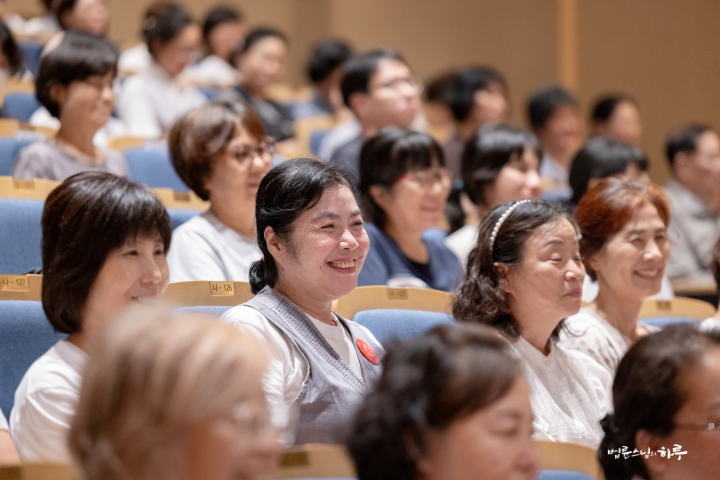
Sacrifice Leaves Behind Regret and Resentment
When you view the world from a broader perspective and see that there are no significant differences, you can make efforts without becoming attached. Suffering arises from attachment. The Buddha taught us to practice diligently without laziness, which is called ‘non-negligence (不放逸) practice.’ Only then will the seeds of suffering disappear. Living without suffering is most important. Only then will you have no regrets in life.
Many people say they sacrificed themselves for their children, husband, wife, or country. However, when their husband leaves or their children move out, they feel regret. ‘How much did I sacrifice for that person, and what do I have left?’, ‘I devoted myself to my country, but what has my country done for me?’ These thoughts arise because they didn’t live with themselves at the center. They feel regret because they didn’t love themselves. 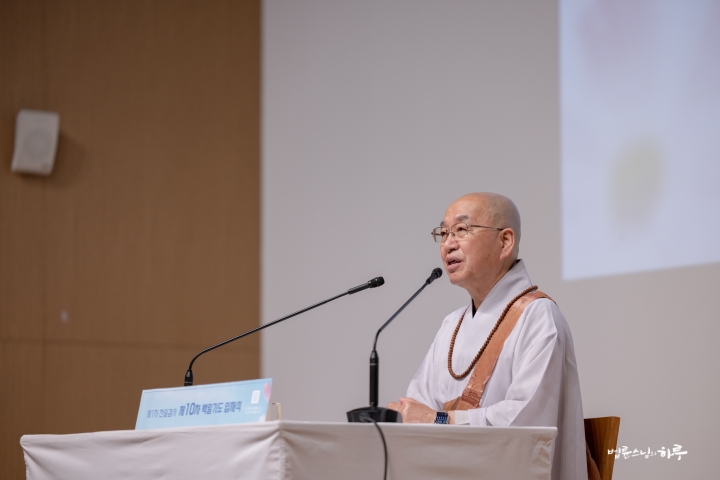
You must always be aware of yourself and cherish yourself, while also cherishing others. Even if you love your wife, love your husband, and love your children, it’s wrong to hate or resent them when they grow old or their feelings cool and they leave. You should be able to end relationships with thoughts like ‘Thank you for being with me all this time’ and ‘Thank you for taking care of me.’ Those who cherish themselves know how to be grateful for both meetings and partings. Otherwise, regret and resentment will always follow.
It’s not important how many prostrations or how much meditation you’ve done, or how much you know about Buddhism. We prostrate, meditate, and read scriptures to realize these principles. Jungto practitioners should never think they have sacrificed themselves. The experience of once loving someone and living for them is all a precious asset. The same goes for going to prison for democracy or giving up property for the country’s independence. Even if you were injured or became disabled in the process, the fact that you once lived dreaming of ideals is itself a precious experience and source of fulfillment. If you appreciate such experiences, you can get along well when together and avoid hatred or resentment when it’s time to part. 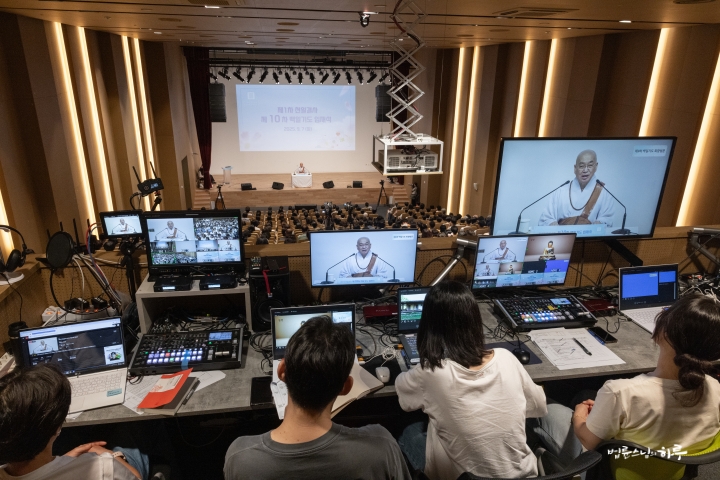
It is extremely rare, among countless people, to form a connection with someone through dating or marriage. Therefore, if we lived together and then parted, we should cherish that experience. If things don’t work out, we can simply part ways—there’s no need to harbor hatred. That’s why we should value the people we’ve met. This applies both when we’re together and after we’ve parted. Ultimately, this becomes a way of valuing ourselves. Hating someone means thinking that the time spent with that person was wasted. However, there is no waste in life. Even after times of suffering pass, we can realize that we learned and understood many things through them. The person who shared their practice experience earlier would have had difficulty truly examining themselves without that suffering. They might have lived floating in the air, intoxicated by their own excellence. But because they experienced suffering, they were able to bring themselves down to earth and stand firmly on their own two feet. We can see that through suffering, they came to truly know themselves.
This doesn’t mean we should deliberately seek out suffering. It means we don’t need to fear difficulties or obstacles. While we don’t need to intentionally invite hardship, we need an attitude that accepts given challenges as opportunities for learning rather than avoiding them. By doing this, we can become free from fear, dread, and anxiety. With this perspective, I hope you will diligently continue your practice through the final hundred days. I would like to take this opportunity to thank all the volunteers who have been active during the past hundred days.” 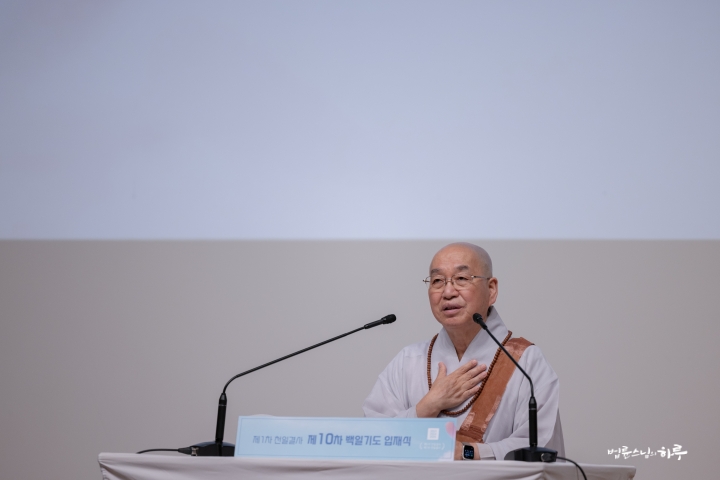
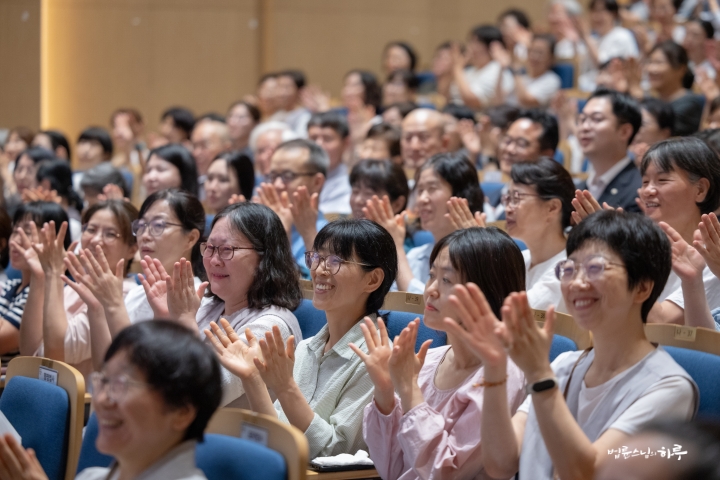
After taking the closing Dharma talk to heart, there was a 20-minute break.
Today’s opening ceremony was attended by writer Kim Hong-shin, Democratic Party members Min Byung-duk and Kim Dong-ah. During the break, Sunim had a brief conversation with the guests. Though it was a short time, he emphasized that the ruling and opposition parties should not exclude each other but pursue a path of inclusion and cooperation.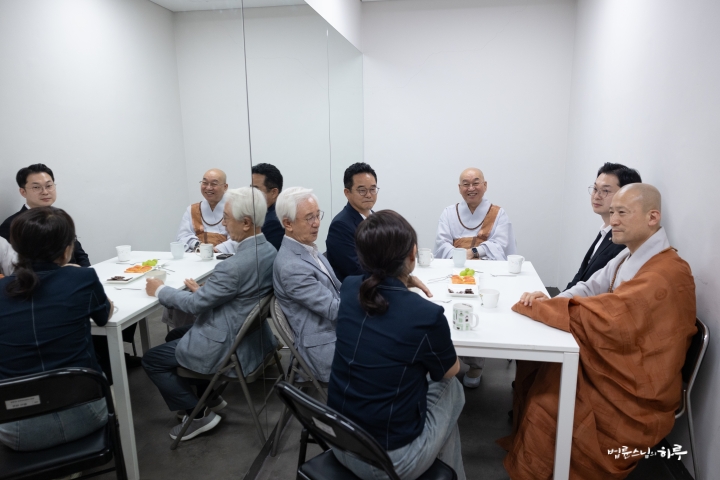
After the break, the 10th 100-Day Prayer opening ceremony began energetically with performances prepared by the lay Sangha divisions. Entertaining skits and choral performances created by all members from Seoul, Mungyeong, Dubuk, and overseas lay Sangha were presented on stage.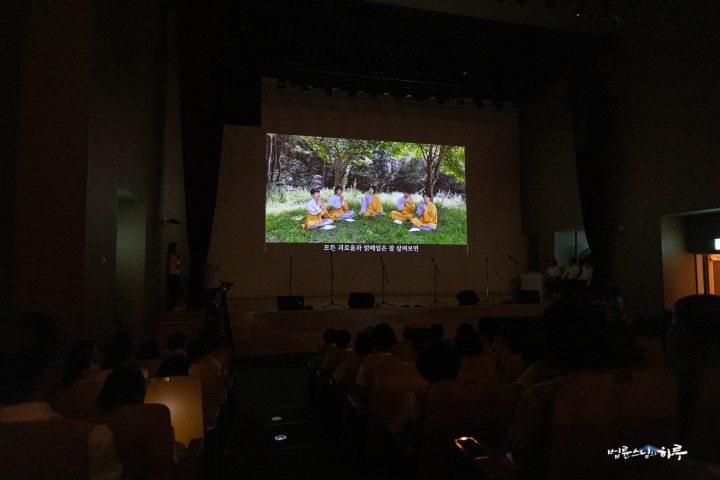
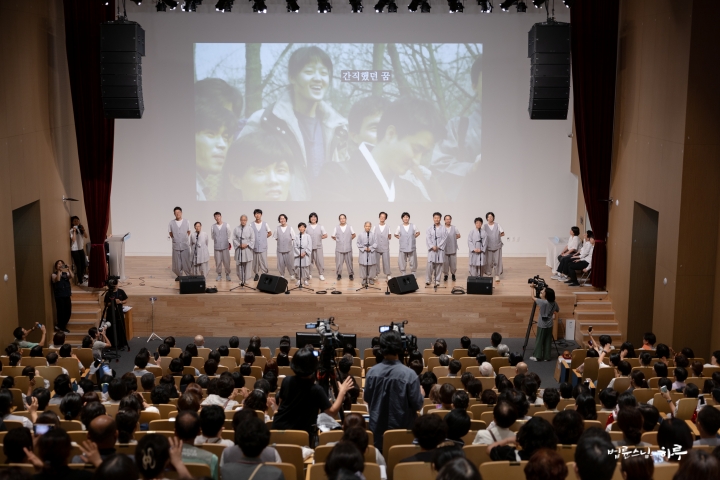
I, I had a dream ♬ Though abandoned, torn, and tattered, I treasured it like a jewel deep in my heart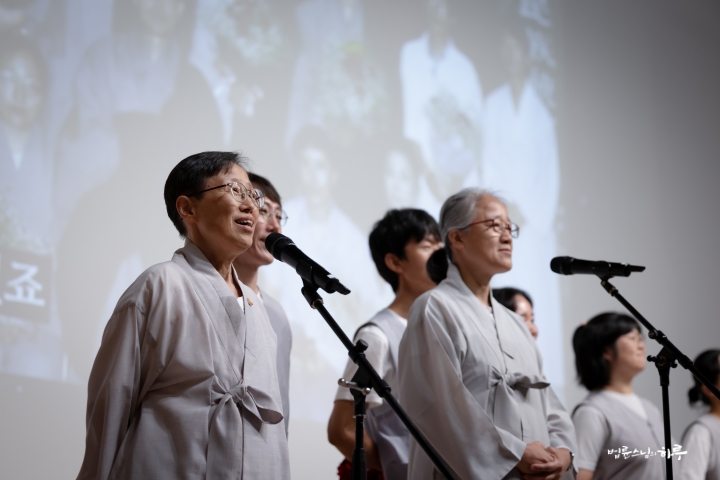
When images of the lay Sangha Dharma Teachers in their twenties appeared on screen, cheers erupted and tears welled up in everyone’s eyes.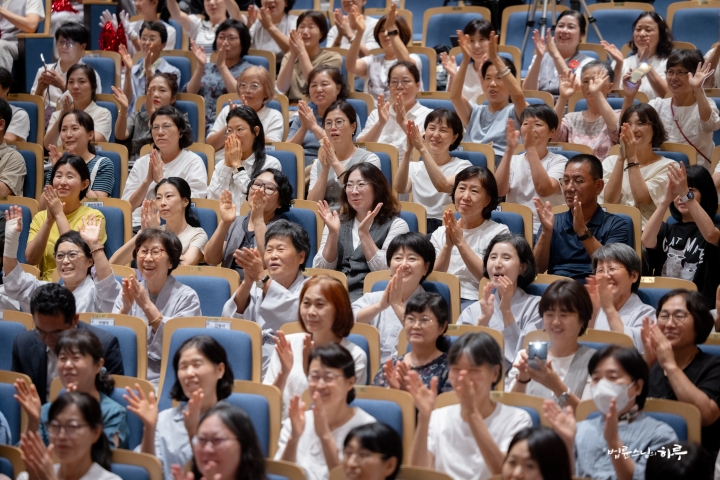
Next, volunteers from the lay Sangha divisions performed energetic choreography on and off the stage while singing.
We’re no longer alone, we’re so moved ♬
Among endless possibilities, I’m grateful to have found practice
if so, then let’s go, welcome to JUNGTO
Whoa-oh-oh, oh-oh, oh-oh
We’ll spread this Dharma to the world, filling it with happiness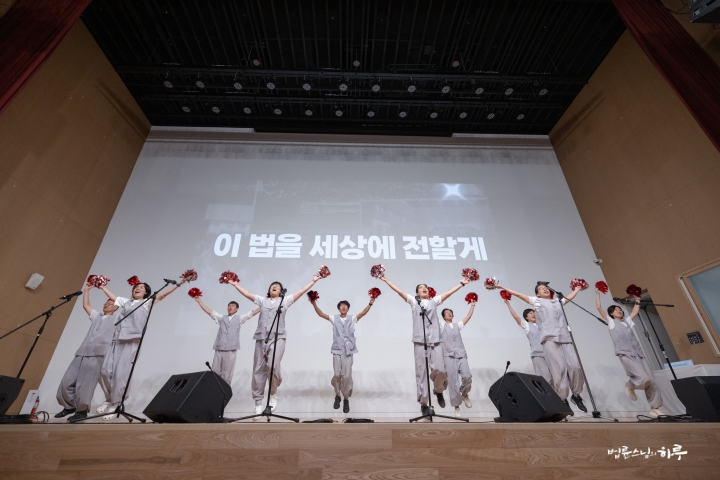
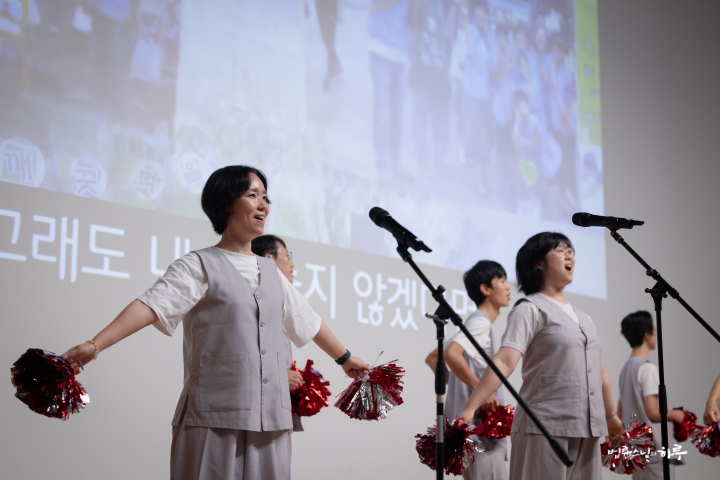
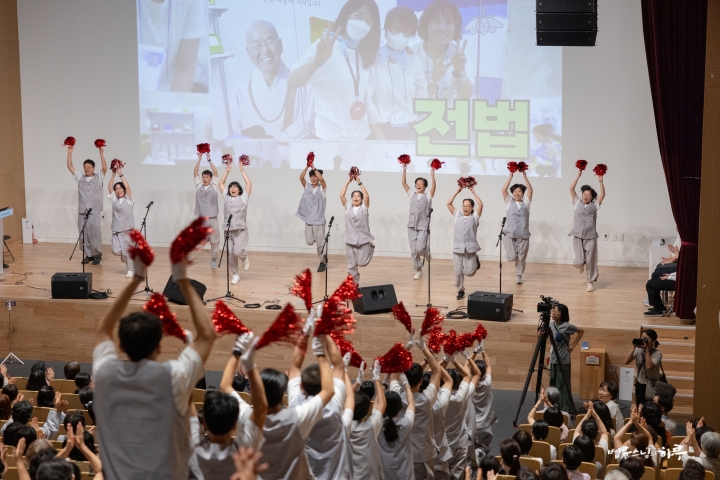
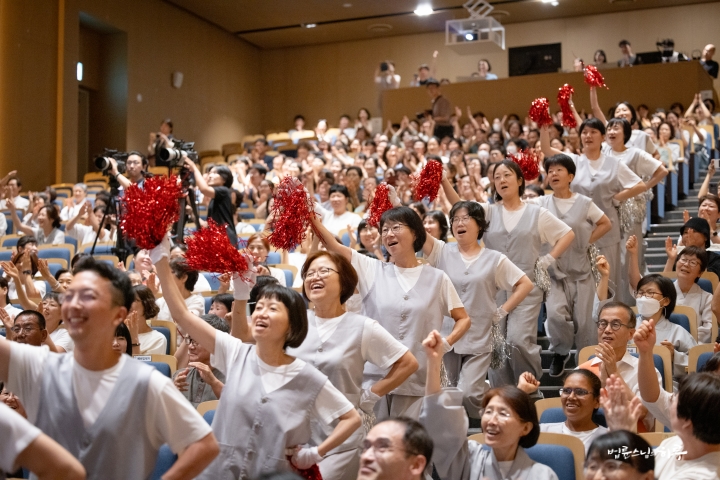
Behind the dancing stage, images of lay Sangha division volunteers from the past who have led Jungto Society’s 33-year history unfolded like a panorama. When the performance ended, MC Kim Byung-jo shared his feelings with emotion.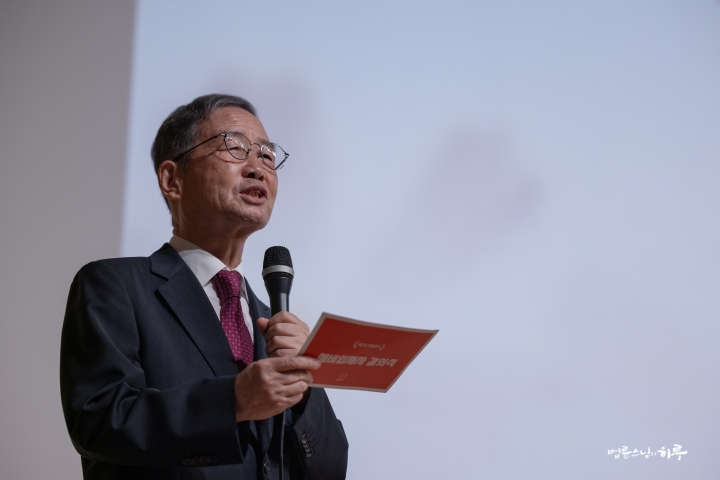
“Personally, it’s been 50 years since my broadcasting debut, and in all the countless events I’ve hosted, today is the first time I’ve shed tears watching a performance. Especially when the Dharma Teachers sang together, my heart was deeply moved. It was a touching performance.”
Everyone gave loud applause and cheers to the lay Sangha Dharma Teachers who lead the members.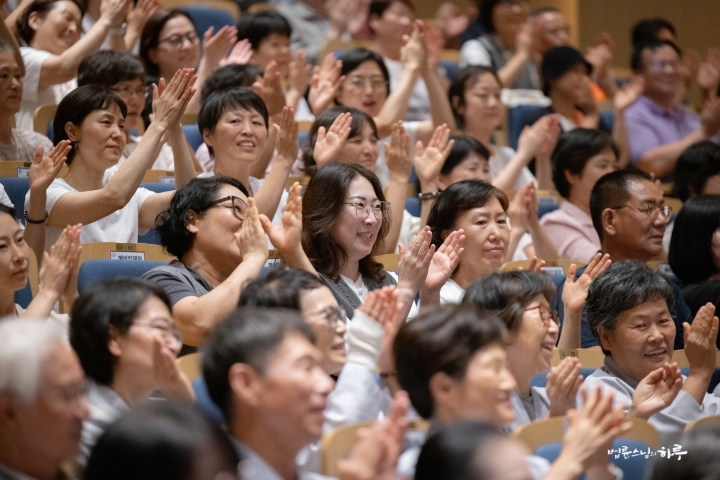
Next, as they began the new 100-day period, a resolution ceremony was held for prospective 1000-Day Practice participants.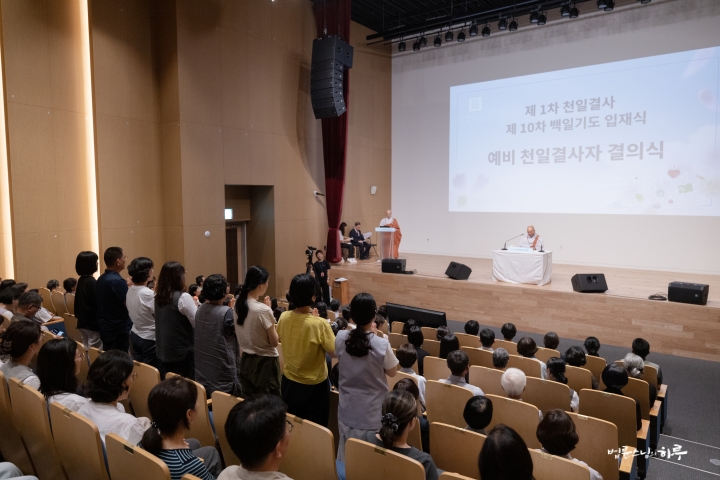
“Jungto practitioners simultaneously pursue personal transformation by changing their thoughts to become happy and social transformation by changing society to become happy. Through practice, giving, and service, they seek to realize Jungto on this earth. To implement a Jungto world on this earth, Jungto practitioners must make 10 promises. First, will you practice diligently every morning at 5 AM to become the master of your own life?”
“Yes, we will practice diligently every morning at 5 AM.” ……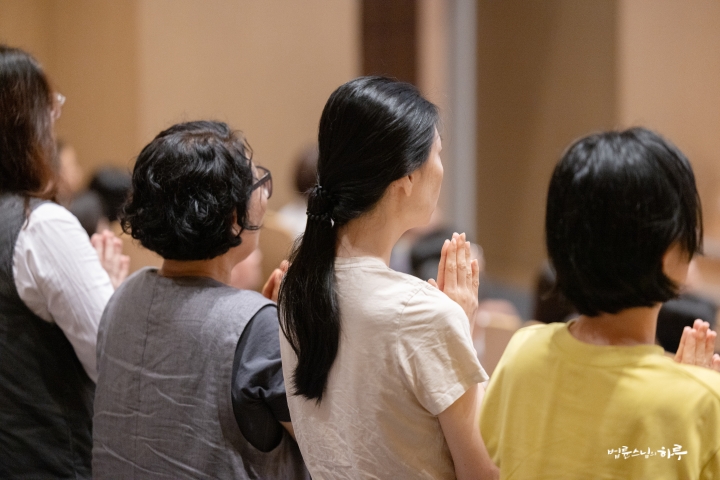
“You have now joined the 1000-Day Practice to create clear minds, good friends, and clean land, and will walk together as Jungto practitioners. Congratulations from the bottom of my heart.”
The existing 1000-Day Practice participants welcomed the prospective participants who had joined the path of practitioners with enthusiastic applause.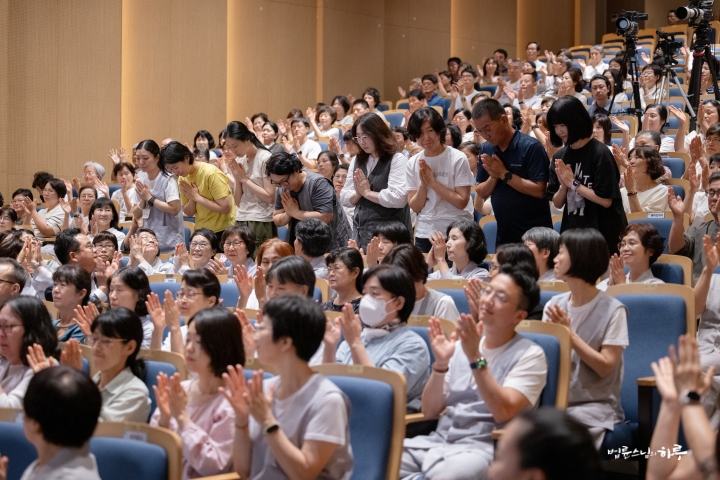
Next, as they began the 10th 100-Day Prayer, they requested an opening Dharma talk from Sunim. Sunim reflected on Jungto Society’s 40-year history, emphasizing the importance of completion and succession, and urged everyone to pray with one heart for peace on the Korean Peninsula and national stability amid the international situation.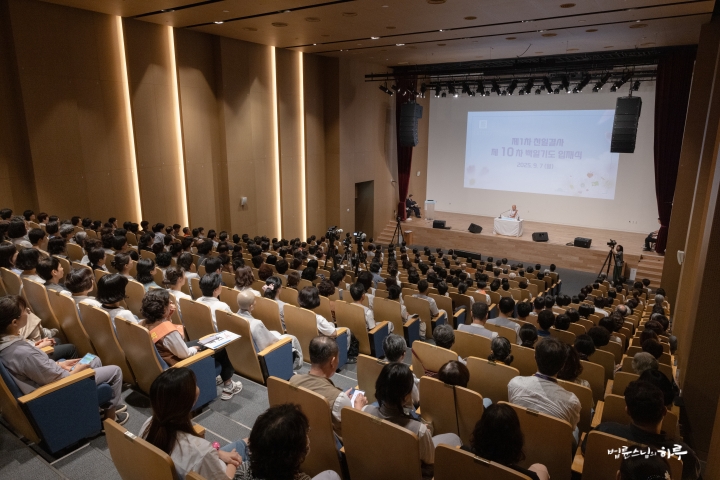
“Did you enjoy the performance prepared by the lay Sangha divisions? It was both a performance and a stage that retraced Jungto Society’s history. Looking back, 40 years ago, we rented a small 15-pyeong office on the fourth floor of a shabby building and opened Biwon Propagation Center, which I think became the root of today’s Jungto Society. The university students and young people in their early twenties who were together then are now over sixty with graying hair. The small steps taken by young people who gathered with purpose in a place with nothing have grown into today’s Jungto Society, now helping those in need in various places overseas. More people have left Jungto Society after volunteering for 3, 5, or 10 years than those who remain today. Today’s Jungto Society is the result of not only the merit of those currently active but also the dedication of all those who have contributed their efforts over time.
Looking back at Jungto Society’s history, before establishing a great vow and beginning the 10,000-Day Practice, there were 10 years when a small group of people gathered and worked together. Then the public gathered to begin the first 10,000-Day Practice, which was completed in 2022 after 30 years. Starting in 2023, we began the second 10,000-Day Practice again, and by the end of this year, 33 years will have passed since we started the 10,000-Day Practice. The 100 days beginning today are the final 100 days of the first 1000-Day Practice within the second 10,000-Day Practice. When this 100-day period ends, we will evaluate the past 3 years and prepare for the new 3 years, entering the second 1000-Day Practice in March 2026. 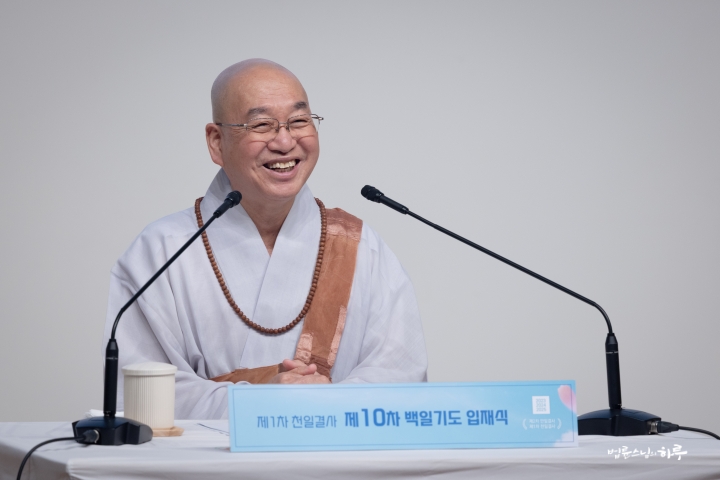
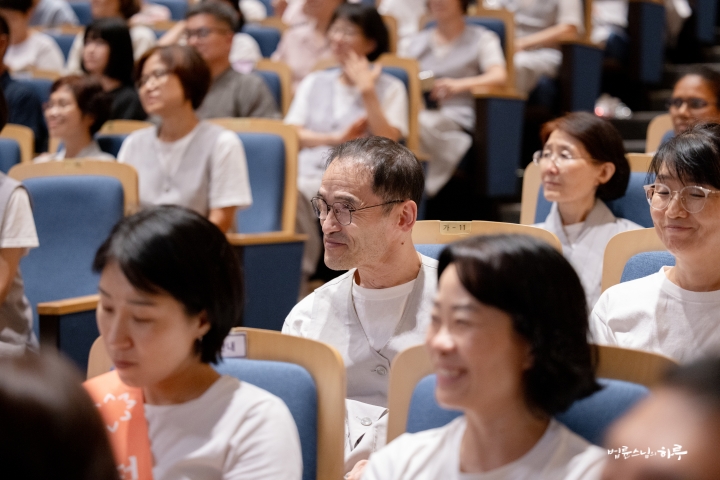
One Hundred Days for Completion, Succession, and Sustainable Development
When we look at figures who have shone throughout history, we often find that they shine not because of their own excellence, but because there were those who carried on their legacy well, making their predecessors shine even brighter. No matter how accomplished someone may be, if their work is not passed on to future generations, they will disappear from history regardless of the merit they accumulated. Therefore, what matters is, first, how well I complete the tasks entrusted to me, and second, how well I prepare for the next person to continue the work. Only when these two elements are in place can there be sustainable development. So these hundred days require us to finish well on a personal level, while simultaneously working together to ensure a smooth transition. In this regard, I hope the remaining hundred days will be a period where we both complete our work well and prepare to pass it on to the next generation.
Diplomatically, the United States is currently applying economic pressure on Korea, including tariff negotiations, while continuing to pressure Korea to join the front against China in international relations. We are trying to participate in this while being careful not to directly provoke China. We are standing at a juncture where pressure is being applied from both the United States and China simultaneously. Looking at Korean politics, we often see that parties gain points only when their opponents make mistakes, rarely when they themselves do well. If both the ruling and opposition parties take pleasure in each other’s mistakes, the country cannot overcome its crises. We need an attitude that embraces one another and puts the nation and its people first. 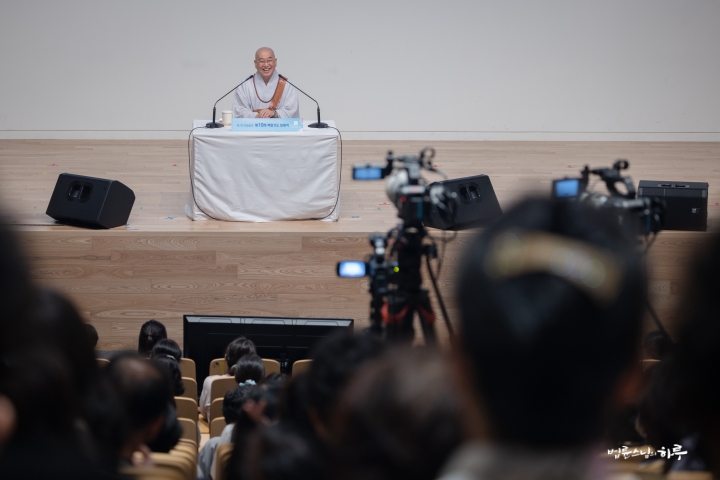
Praying for Peace on the Korean Peninsula and National Stability
Along with how to navigate relationships with the U.S. and China, the most important task is improving inter-Korean relations for peace on the Korean Peninsula. Additionally, when the Ukraine war ends, Russia’s reconstruction demands will increase significantly, and Korea is the most suitable country for that business. Therefore, maintaining good future relations with Russia is also very important. However, the previous administration failed to properly manage relations with Russia under the pretext of ‘standing on the front lines of freedom.’ While ideology is important, national interests are also crucial during turbulent times. From this perspective, I ask that you all unite in prayer so that national governance can stabilize by the end of the year. Regardless of which side you support, I ask that you pray with a heart that desires national stability. With this mindset, let us embark on a new 100-day journey.”
With loud applause, they began the final 100 days of the first 1000-Day Practice.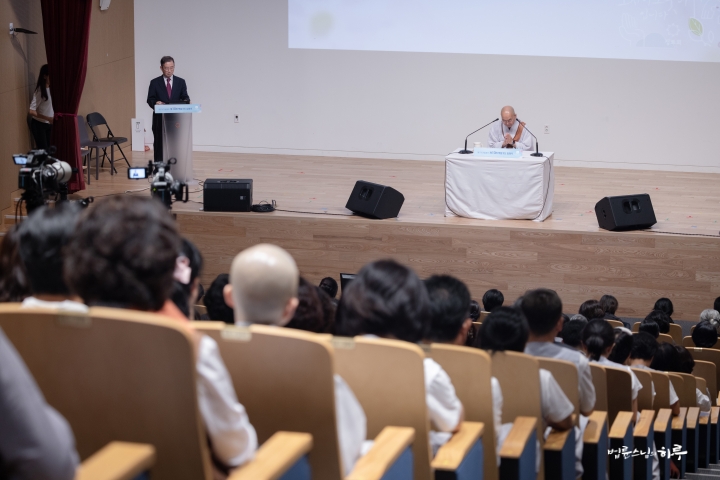
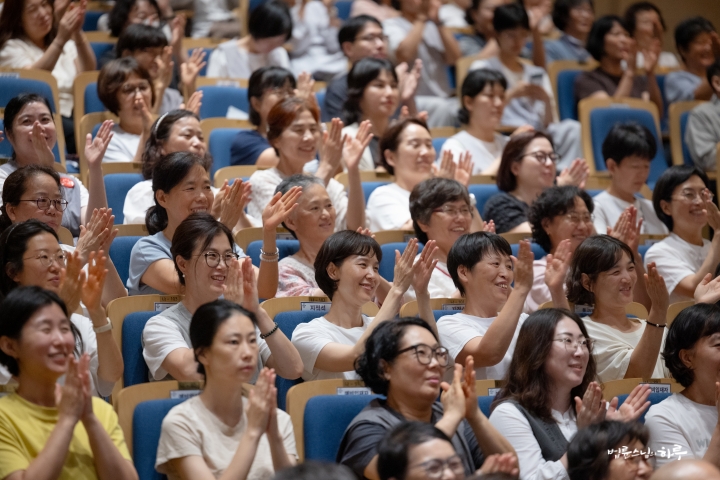
Next, they announced the promises that all 1000-Day Practice participants must practice together during these 100 days. They decided to widely spread Jungto Dharma School and Happiness School so that all citizens can be happy during the 100 days.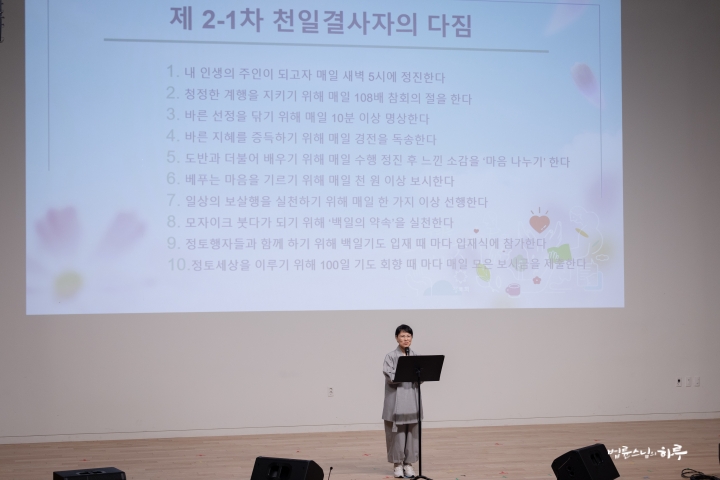
Next, the Gyeongnam Division presented a performance to mark the new 100 days. Through dance and song, they movingly portrayed the process of encountering Buddha’s teachings, going through initially awkward and difficult times, and being reborn as practitioners together with fellow practitioners.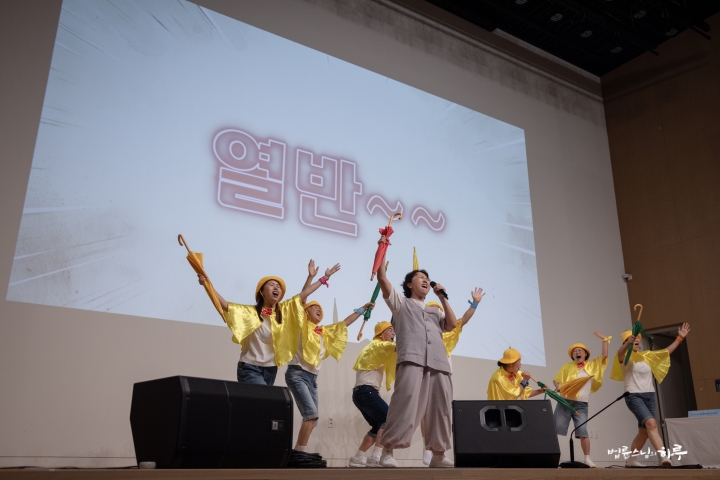
Practitioners gather on the green hill, about to begin the march of spreading the dharma ♬
Toward the wilderness, toward the world
In the early morning when dawn breaks, practice diligently with a quiet mind
Let’s escape from the forest of afflictions
Like the words of the great Buddha long ago, “Gate gate paragate”
Let’s depart to spread the dharma to the world~ –
As they twirled red, yellow, and green umbrellas while performing lively movements to match the lyrics, everyone cheered.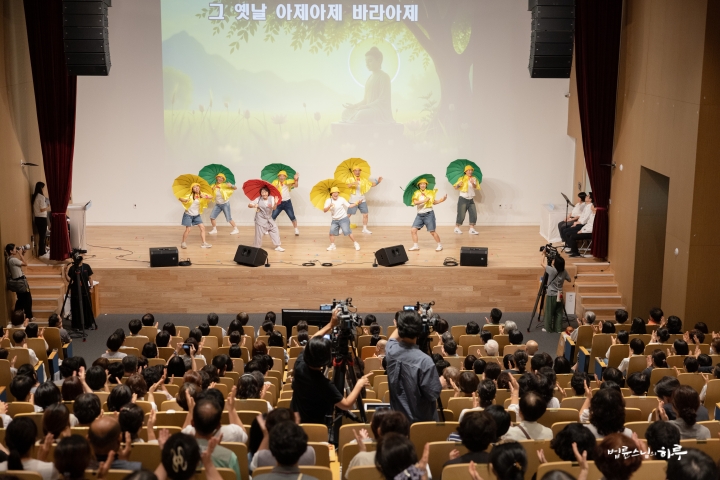
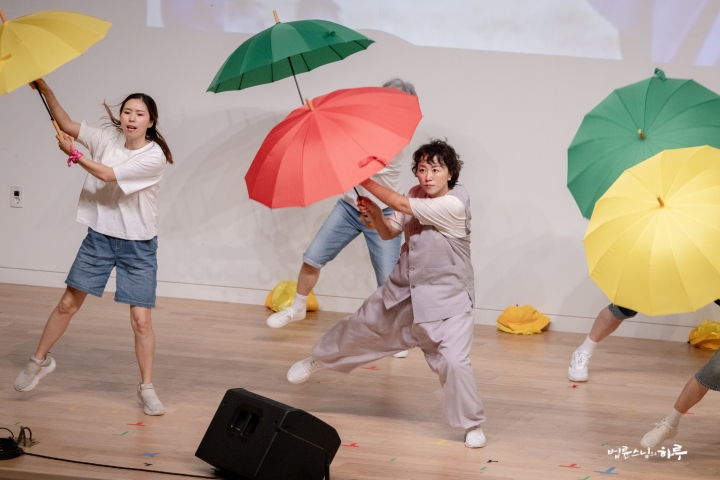
The practitioners who had let go of their mental suffering through practice now turned their eyes beyond themselves to the suffering of the world. Looking at the suffering world, the practitioners who had once fallen rose again, expressing through dance and song how they found courage together with global citizens. As the performance reached its climax, everyone in the audience stood up, waving their hands and following the movements.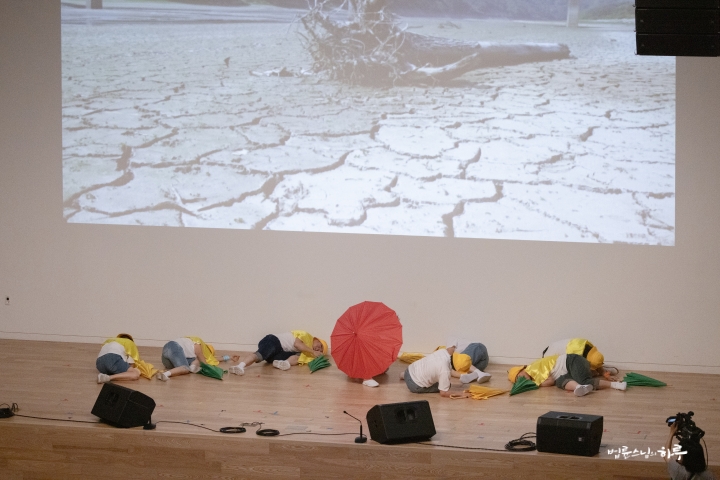
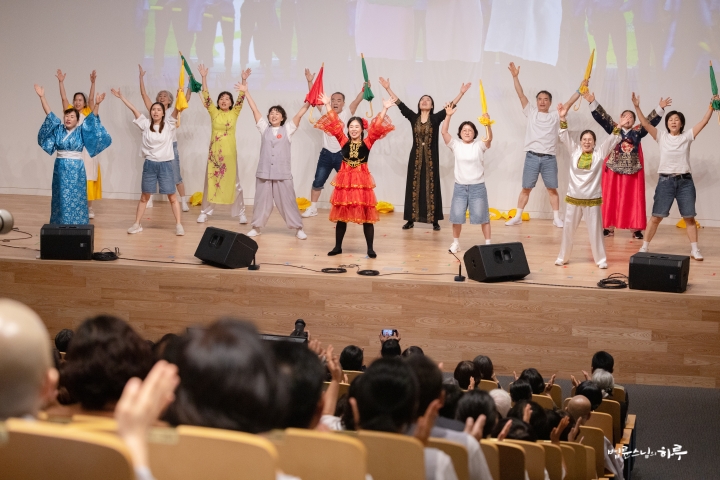
Give me storm-like courage once more ♬
So I won’t yield even to rough waves
Hope to be carved anew on the vast earth
Because we are practitioners, confidently, be strong!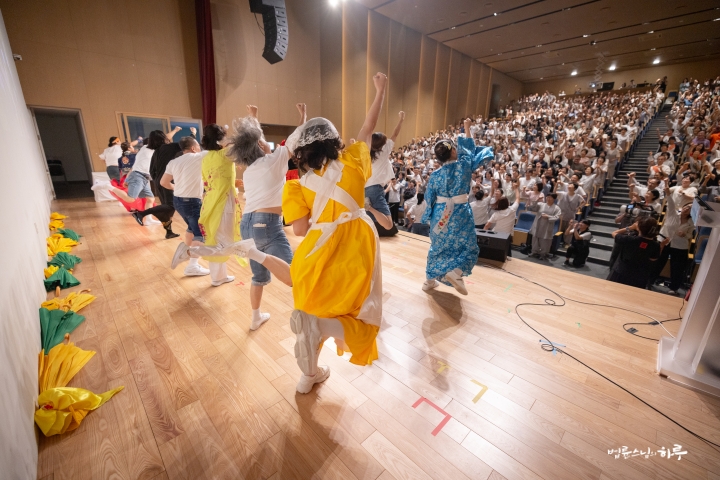
They concluded the performance by shouting slogans together, pledging for the new 100 days.
“We are the Mosaic Buddha!”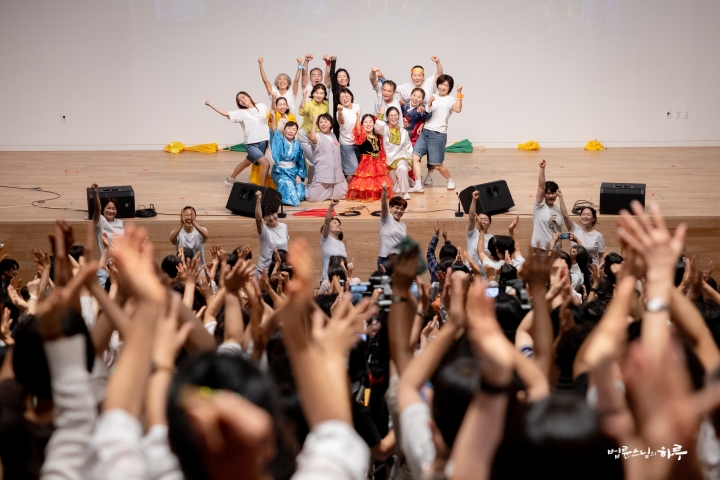
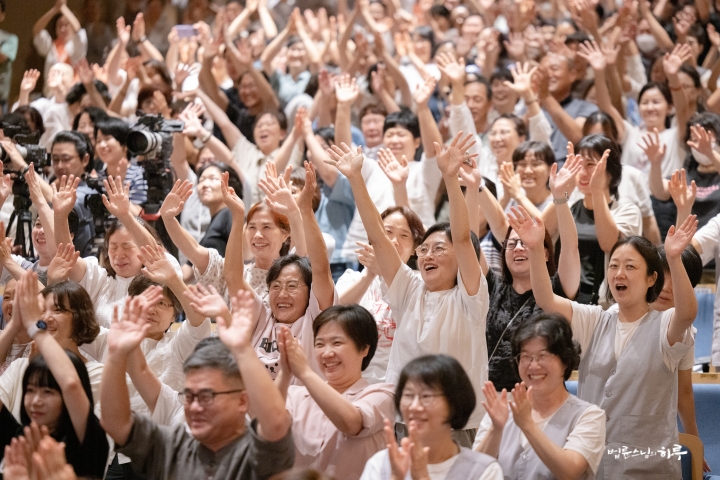
When the performance ended, the host said with a smile:
“That was an even more amazing performance than K-pop Demon Hunters. They showed us through moving dance and song how global citizens can create a beautiful world together.”
Before they knew it, it was time to conclude. As they wrapped up the opening ceremony, they listened to words from Dharma Teacher Seonju, the head of the Dharma Teacher Group. Dharma Teacher Seonju expressed her joy in Gyeongsang dialect while looking at the Gyeongnam Division members and gave closing remarks.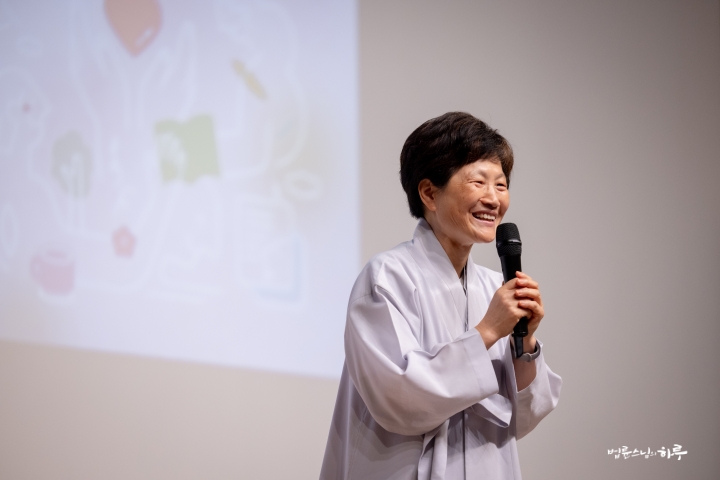
“It’s wonderful to see you all. Especially those from Gyeongnam Division who came up early this morning, I’m really glad to see you. Most members from the Community Division and Gyeongnam Division are in their 50s or 60s, and they suffered quite a bit with their knees and ankles while preparing for this performance. I also had trouble with my ankle during practice. Though our bodies suffered, our hearts remained youthful. Still, today was tremendously enjoyable. How was it for all of you?
While listening to today’s closing dharma talk, I took time to examine whether I have regrets, resentments, and whether I love and respect myself. While listening to the opening dharma talk, I renewed my determination to finish well and also to prepare well for a new beginning. I hope we all examine ourselves well during the 100 days as we complete our practice, and I look forward to seeing you again at the closing ceremony on December 14th.”
It was a message that deeply conveyed the power of steady practice, like clothes getting wet in a drizzle.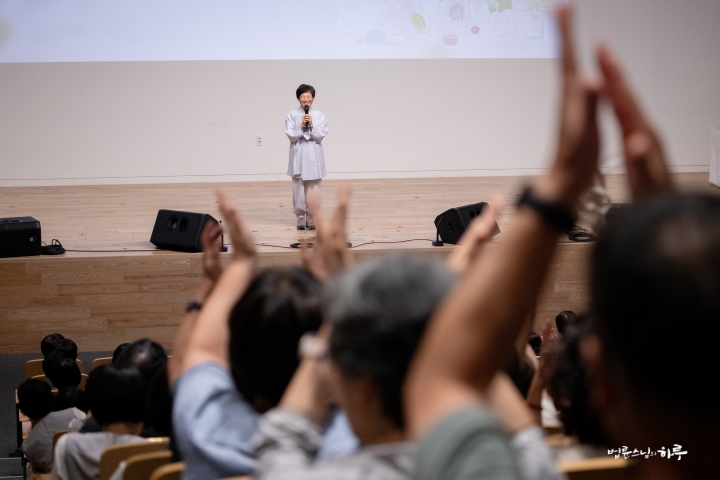
Promising to meet again at the next opening ceremony on December 14th, they concluded the 10th 100-Day Prayer opening ceremony. Everyone sang the Four Great Vows and the dispersal song together with vigor.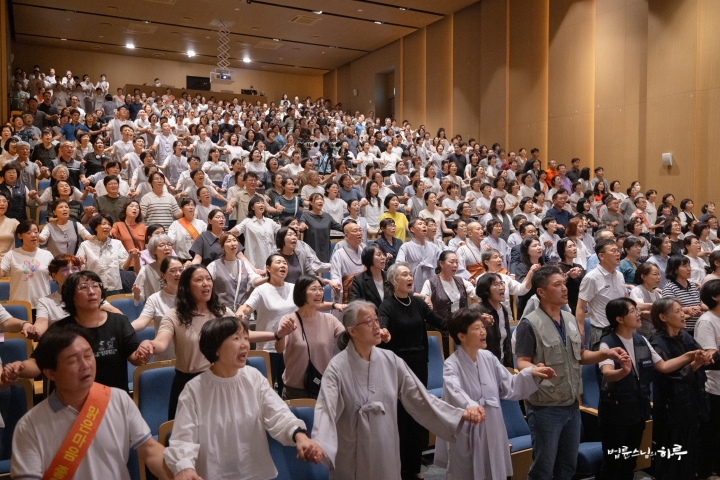
After expressing gratitude to the Gyeongnam Division members who had prepared the stage performance and traveled a long way since early morning, Sunim moved to the underground dining hall for lunch.
The Gyeongnam Division members scattered in small groups to eat lunch with their fellow practitioners using the packed lunches they brought from home, while Sunim ate separately with the attending guests.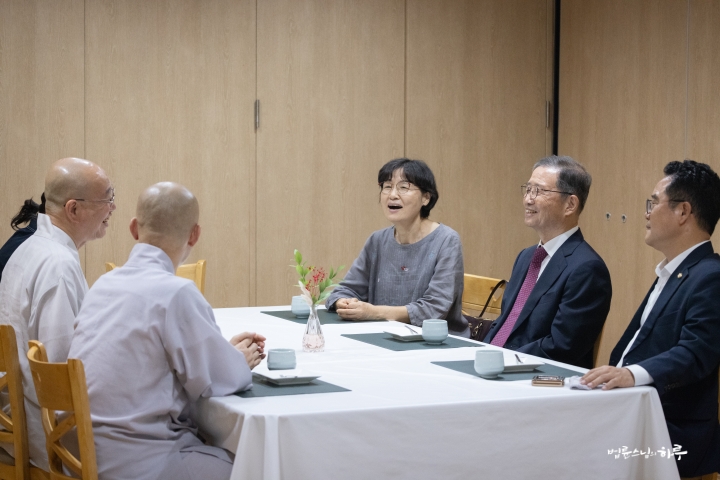
At 2 PM, the Gyeongnam Division Members’ Day event began. With all Gyeongnam Division members gathered in one place, they recited the Three Refuges and the Heart Sutra. After listening to encouraging words from the President of Jungto Society, they watched a video about the history of Gyeongnam Division together.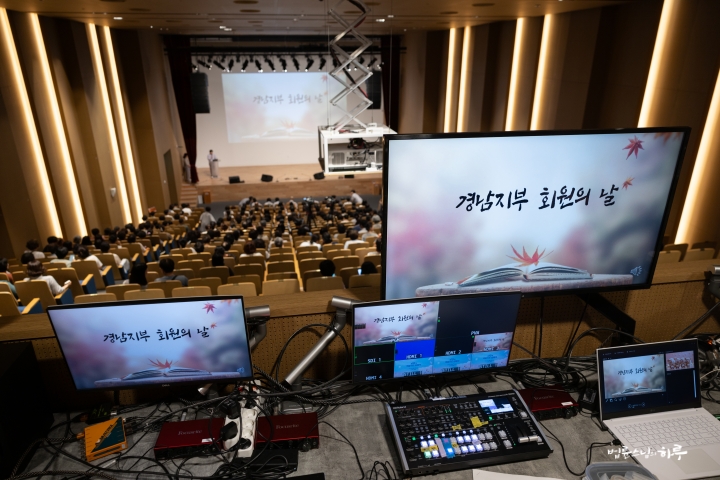
Next, they had time for branch introductions. The Geoje, Gimhae, Changwon, and Jinju branches presented enthusiastic introduction performances in order.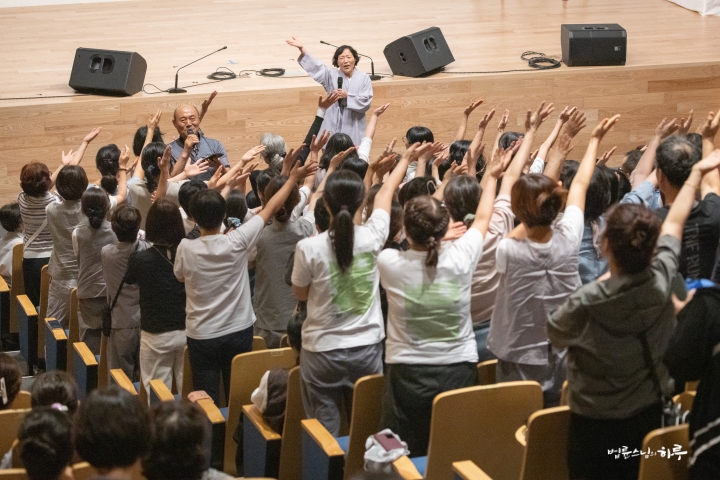
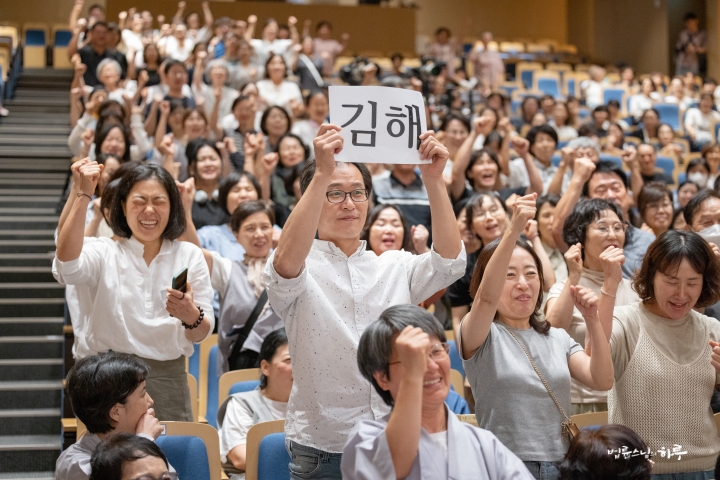
Next, they watched the Members’ Day celebration performance prepared by Gyeongnam Division. The Goseong Ogwangdae Won Yangban dance and two Korean folk songs by Baek Mi-young from Gimhae branch were performed with great enthusiasm.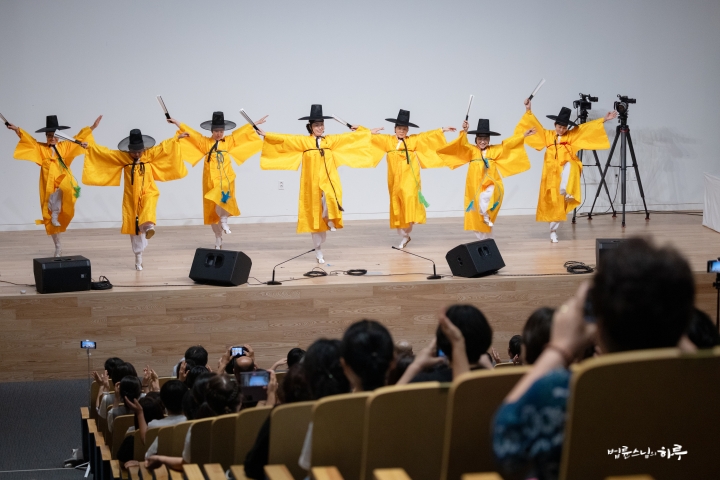
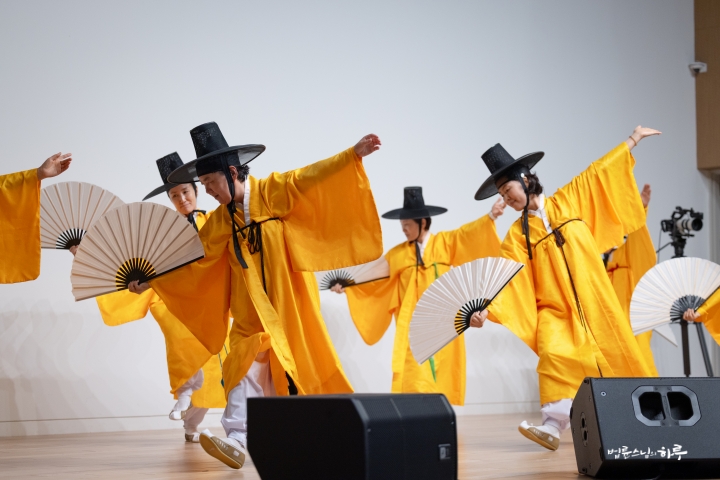
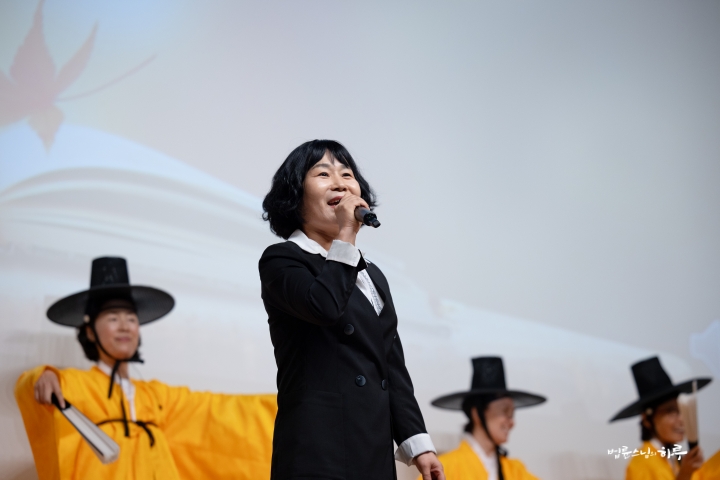
The excitement of the event reached its peak. They powerfully began Gyeongnam Division Members’ Day with branch introductions and carefully prepared performances.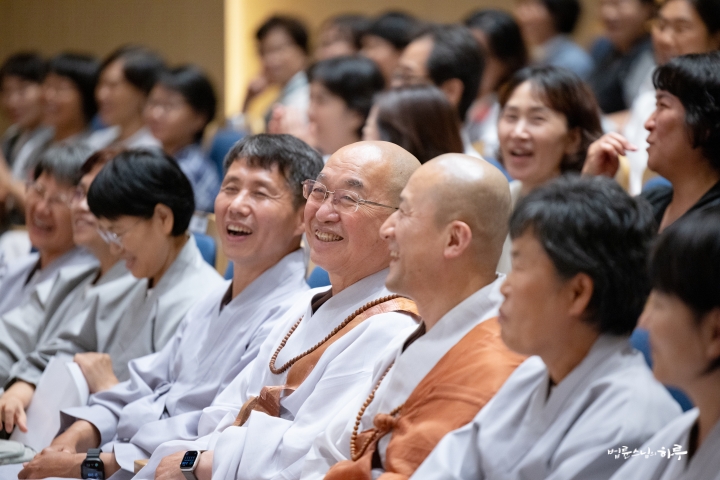
After calming their minds again, everyone requested a dharma talk from Sunim with three prostrations. Sunim greeted them with a smile.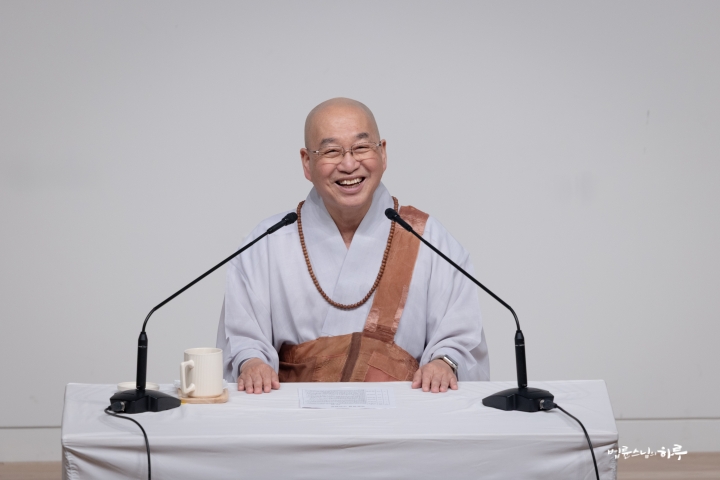
“Thank you all for your hard work coming up early this morning. The President said no one was dozing, but when I was giving the opening dharma talk this morning, I saw some were actually sleeping. There were no dozers. (laughter)
While watching the celebration performance just now, I wondered why women played the role of idle men when women suffered so much because of those idle men. Was it fun to imitate idle men like that? That’s why men act like idle men. This is my Gyeongsang-style compliment that the performance was good.” (laughter) 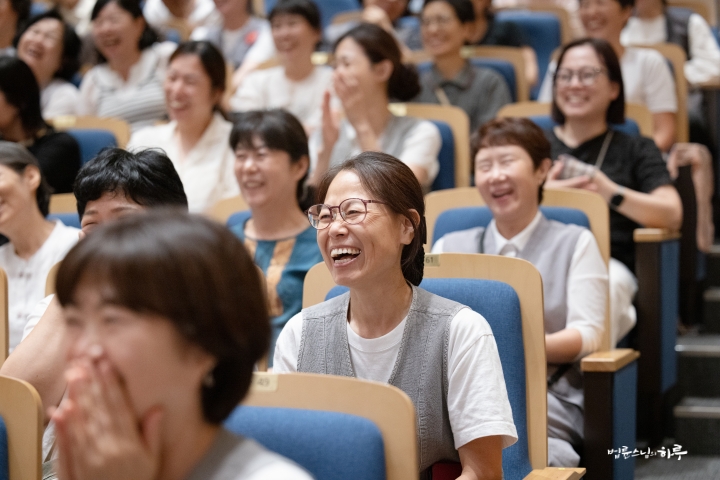
Then, anyone could raise their hand and ask Sunim questions about difficulties they faced during their activities. Five people had conversations with Sunim for an hour and a half. One of them said she had taken out divorce papers after conflicts with her husband and wanted Sunim to check whether her choice was right.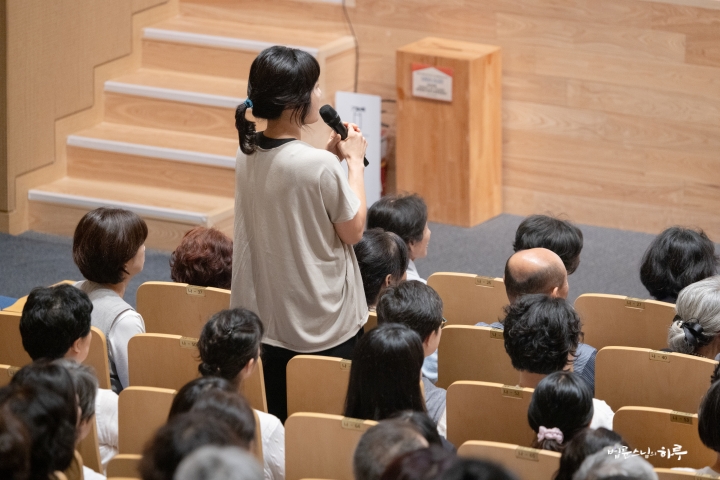
I Handed My Husband Divorce Papers Right After Our Fight
“It seems you’ve been unhappy with your husband for a while. Even so, this incident doesn’t constitute grounds for divorce.”
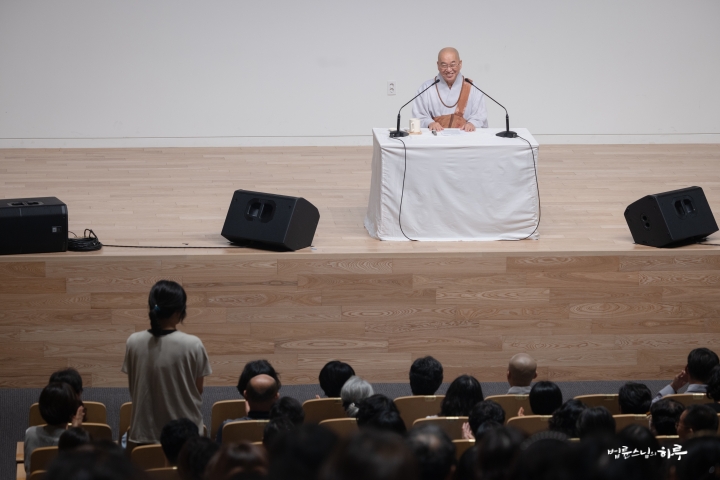
“Let me tell you about what happened two weeks ago. When I woke up my older son in the morning, he got irritated. When I scolded him for being irritated, he talked back saying he wasn’t irritated. Frustrated that we couldn’t communicate, he even cursed at me. When I told my husband about it, instead of scolding the child, he blamed me saying, ‘He acts that way because you get angry.’ So I asked my son to repeat what curse words he used, and he cursed again. I slapped him once to bring him to his senses, and my son punched me in the face. Even seeing that, my husband didn’t scold our son but instead poured out all his accumulated complaints against me.
Yesterday when I asked my husband if he had signed the papers, he said he would give them to me when things were sorted out and told me to wait. He said everything was my fault for starting a different job. I shot back that it was his fault for not properly providing living expenses. Actually, I was severely stressed due to financial difficulties. I had hwabyung (anger syndrome) and couldn’t sleep because of headaches, but fortunately, after encountering Happiness School, I began to live somewhat like a human being.
I had decided on divorce before, but at that time I got angry a lot trying to change my husband and almost divorced. After encountering Jungto Society and studying the mind, I had been thinking ‘It’s my fault,’ but this incident made everything explode again. Part of me wants to just get it over with like homework, and thinking I have strong backing, I’m not afraid. Having lived like this until now, I don’t worry much thinking I can’t survive outside.”
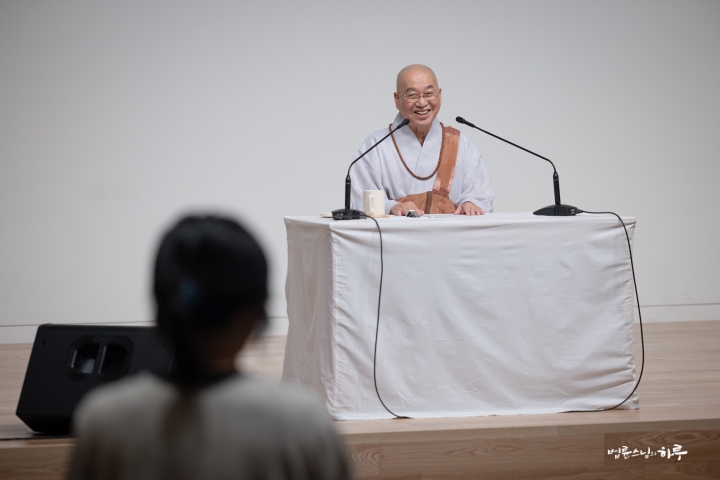
“Right now you’re anxious inside. You’re scared about what will happen if your husband really signs the divorce papers, aren’t you?”
“That’s right. I do worry about ‘Where will I go if we divorce?'”
“Your confident attitude is good. However, it must be somewhat difficult for a man to live with someone like you. Listening to your story, I think it would be hard for your husband to live out his natural lifespan. And teenage children naturally don’t listen to their parents well. So you shouldn’t make an issue of children not listening. When a child wakes up late, it’s better to let them be late rather than getting angry. If you forcefully provoke them, their rebelliousness only grows. Cursing or using fists happens because their psychology has been suppressed. Having continuously experienced unfair situations since childhood, they’ve now reached the stage of confronting with words and actions.
If you see it as outrageous, it’s endlessly outrageous and they seem like bad kids, but rather you should use this as an opportunity to realize ‘The child has been suppressed all this time.’ There’s no need to be scared, and no need to defend them either. If you respond forcefully, it becomes even more unseemly. When a mother hits a child out of anger, the child isn’t deeply hurt by one hit. But when parents get hit by their children because of this, it creates a bigger wound. So it’s better not to provoke them at all.
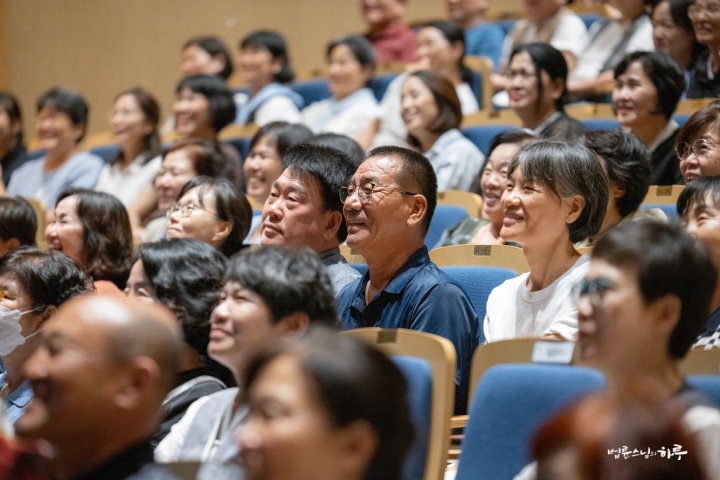
While it’s true that you’re unhappy with your husband, this isn’t grounds for divorce. You can divorce if both parties agree, but if one party doesn’t want to, even the court will send you back home. There need to be disqualifying reasons such as infidelity, causing financial loss, physical abuse, or failure to fulfill marital responsibilities for a divorce ruling. Your case doesn’t qualify as grounds for divorce. The fact that your husband won’t sign the papers means he doesn’t want a divorce.
Rather than truly wanting a divorce, you’re using the threat of divorce to pressure your husband into surrendering and saying, ‘I was wrong. I won’t do it again.’ You’re playing the divorce card to bring your husband to his knees. However, your husband might also sign the papers out of spite in a moment of anger. If you try to take it back then, it would hurt your pride. Many couples divorce in anger like this even when there’s no real reason for divorce.
From now on, don’t bring up the divorce papers anymore. Live as if you’ve forgotten about them. If your husband comes with signed papers, then there’s nothing you can do. If you want to stay together, you’ll have to swallow your pride, and if you absolutely can’t live together, then divorce. After living apart, if it doesn’t work out, you can always get back together. The fact that your husband isn’t signing the divorce papers now means he doesn’t want a divorce. But he also doesn’t want to grovel before his wife. Let it end in a draw at this point.
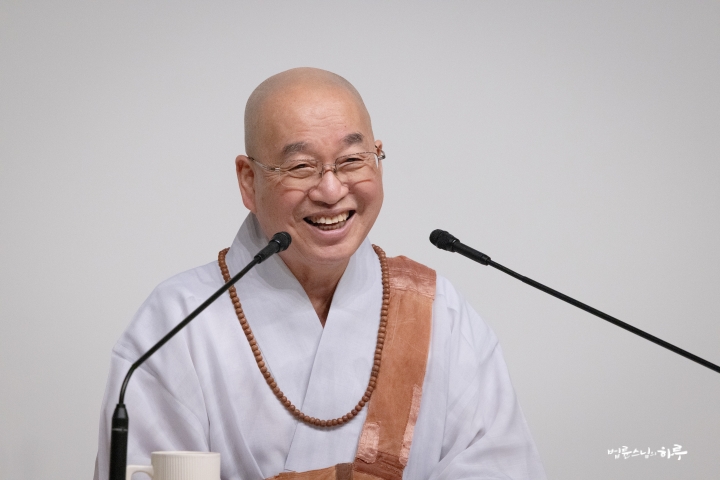
It’s better not to ask about the divorce papers and just live as you are. The choice has now shifted to your husband. If he signs the papers, you can pack your things and leave the house. You don’t need to worry about the children. Just tell them, ‘Live well with your father,’ and leave them be. If you’re thinking about meeting another man, having children makes things complicated. If you’re considering remarriage, it’s much better not to have children. If the children follow you, you can live together. It’s better to be cold and say, ‘If you like it here, stay here. Do whatever you want.’ Not caring about what others think, like you do, can be an advantage in certain situations. Don’t worry about what others say. If your husband doesn’t sign, don’t ask anymore and just live your life.”
“Yes, I understand. Thank you.”
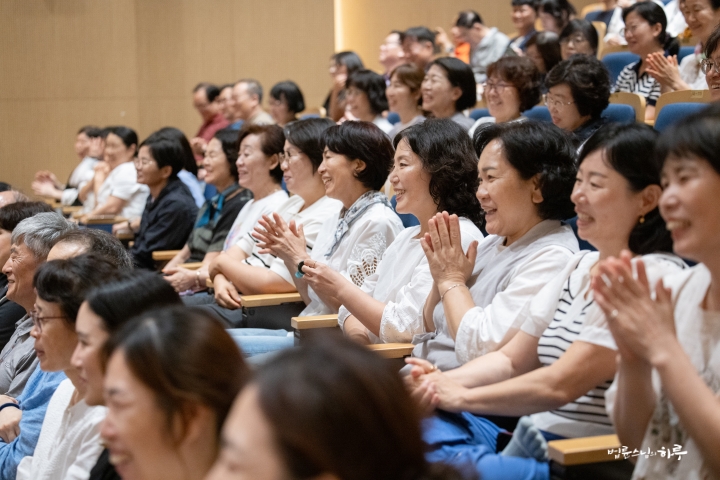
Questions continued one after another.
An acquaintance who heard about the participation requirements for Jungto Society’s Weekly Dharma Assembly, meditation, and morning practice asked why the conditions are so strict if it’s volunteer work. How should I respond?
After taking on the role of Group Facilitator, I’m suffering from severe stress and physical symptoms. How can I overcome this crisis?
What does ‘adverse practice’ mean in Buddhism, and why do practitioners engage in it?
How should we view the decline of provincial cities with decreasing populations?
The teachings of the Diamond Sutra and the Ksitigarbha Sutra seem different. What are the differences?
How can parents help their military officer son who has even considered suicide?
As Sunim answered the questions one by one, it was already past 4 PM. A bus bound for Gyeongnam had arrived and was waiting outside, so unfortunately, the event had to conclude. Sunim gave closing remarks.
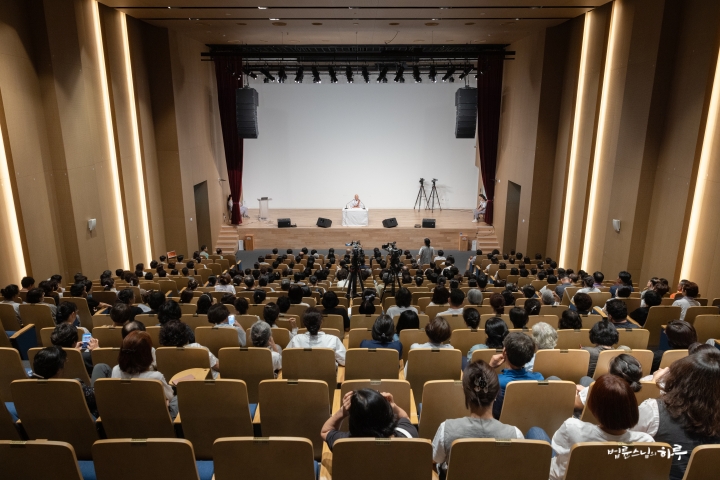
“Thank you for coming from far away. The Standing Committee for the 1000-Day Practice is discussing plans to hold opening ceremonies by branch or chapter where members can gather together. Starting next year, we’ll arrange more time to meet face-to-face and be together. Thank you.”
After hearing closing remarks from Dharma Teacher Cheong Gwang-myeong, who oversees the Gyeongnam branch, the Members’ Day event concluded with the Four Great Vows.
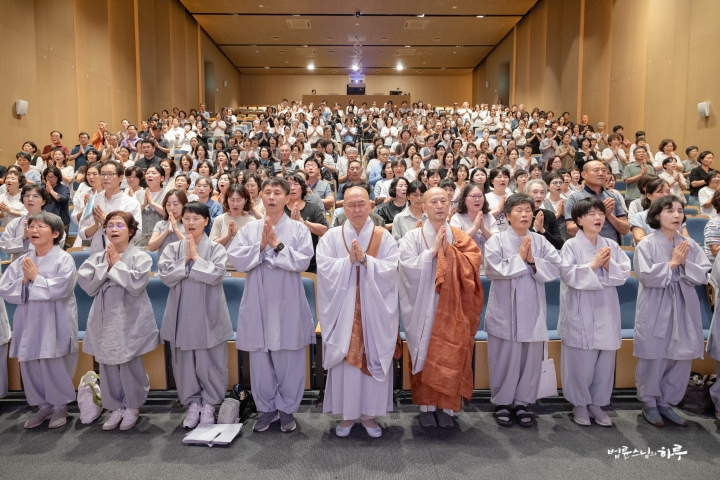
They then took a commemorative photo together. With a commitment to live lives that help neighbors and society even a little, they shouted “Fighting!” in loud voices.
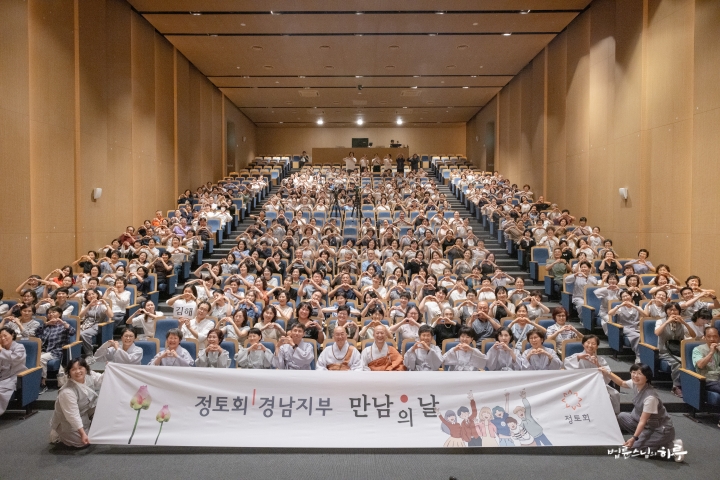
After the Gyeongnam branch members cleaned the auditorium thoroughly, they all left the Jungto Social and Cultural Center together and walked in line toward where the bus was parked.
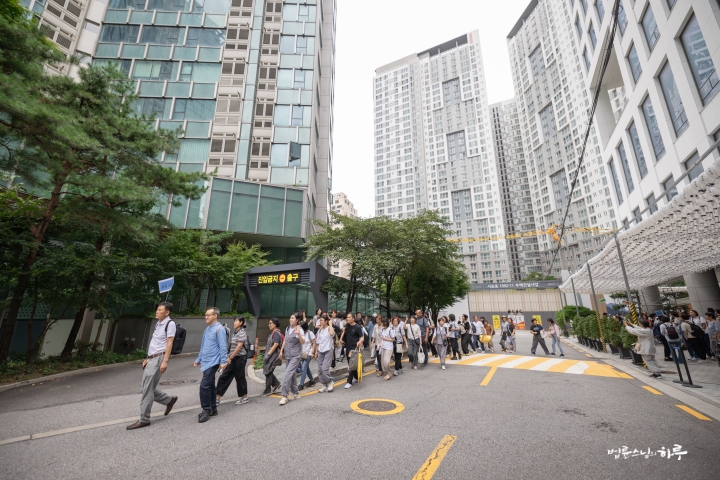
Sunim moved to the Jungto Center and had a brief meeting with practitioners who would be dispatched to JTS project sites in India and the Philippines in a few days. Two members of the 17th Haengja Institute class would be dispatched to JTS India, and one person who had completed the 100-Day Chulga program would go to JTS Philippines.
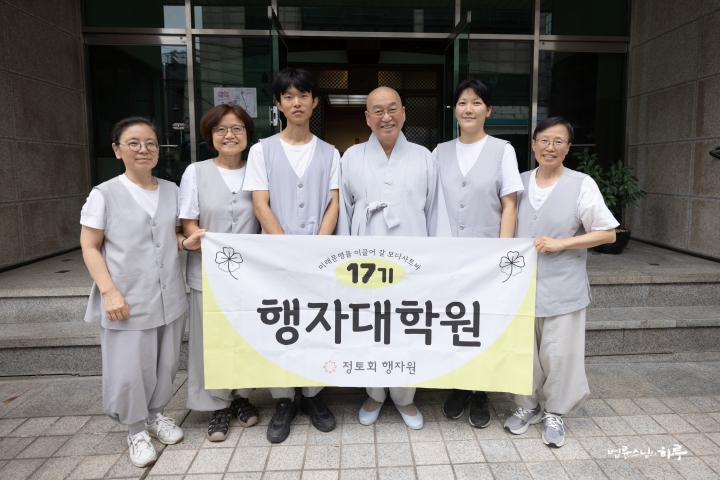
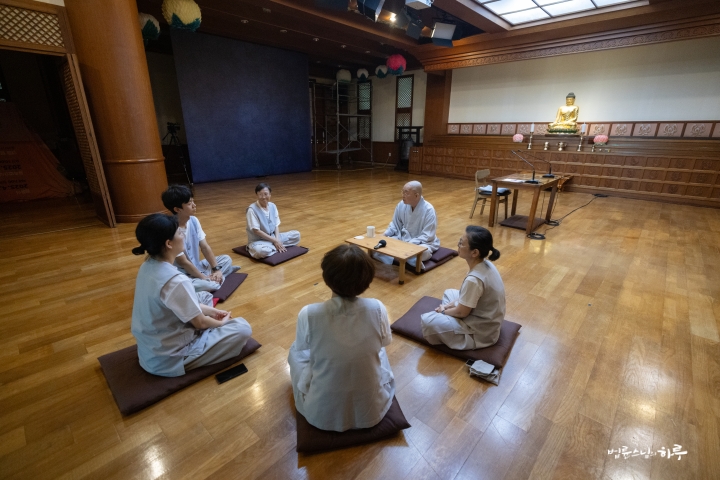
Sunim offered words of encouragement to the three people.
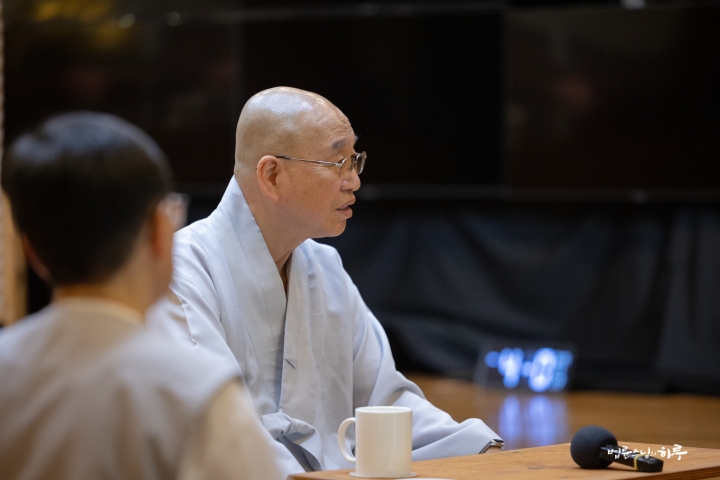
“When you go to India now, the rainy season has ended but it will still be hot. The first three months are an adaptation period. You shouldn’t try to make improvements by arguing about what’s right or wrong. Even if Indian people seem lazy to me, when you actually go and live in India, there are reasons for everything. There are always reasons why people live the way they do. So for three months, you need to adapt yourself to the given environment. After three months, if you still see problems, you can make suggestions for improvement. If you only adapt to how Indians live, there won’t be any improvement, but if you raise issues from the beginning, you become someone with too much discriminating mind. So for three months, you need to keep your mouth shut and take time to adapt. But if you only adapt, you won’t make improvements. You’ll become like Indians and just think ‘that’s how it is.’
The climate in the Philippines is fine for activities. Mindanao is a hot region, but the JTS center is located at 1,000 meters above sea level. However, clouds always hang over the mountains, so it rains frequently. So while the temperature is fine, the humidity is high. Try living there and adapting first. The person going to the Philippines, have you retired?”
“I was a teacher. I took early retirement.”
“That’s good, especially since Korea has a surplus of teachers. It’s better to go where you’re more needed and be put to good use.”
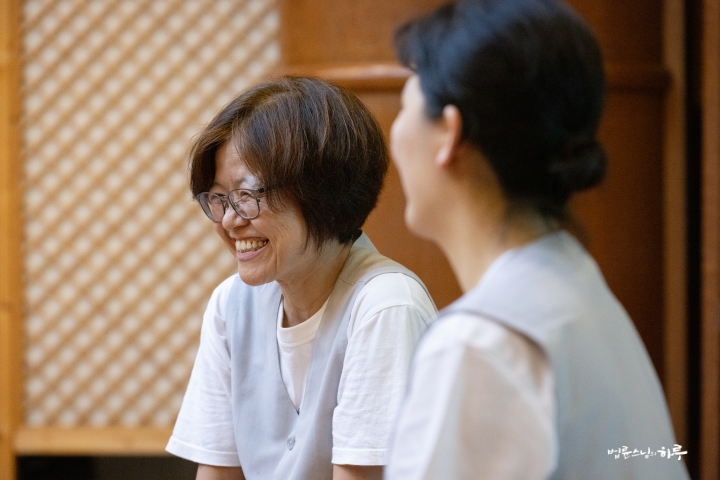
The three people bowed three times to Sunim.
“We’ll have a safe journey.”
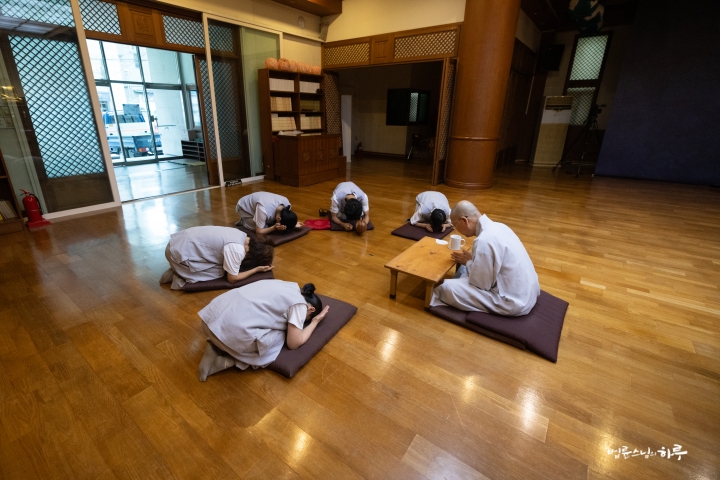
Sunim then packed for his European lecture tour. After packing books as gifts for volunteers and clothes in his suitcase, he left the Jungto Center at 7:30 PM and headed to Incheon Airport. Staff members bid farewell to Sunim as he departed overseas.
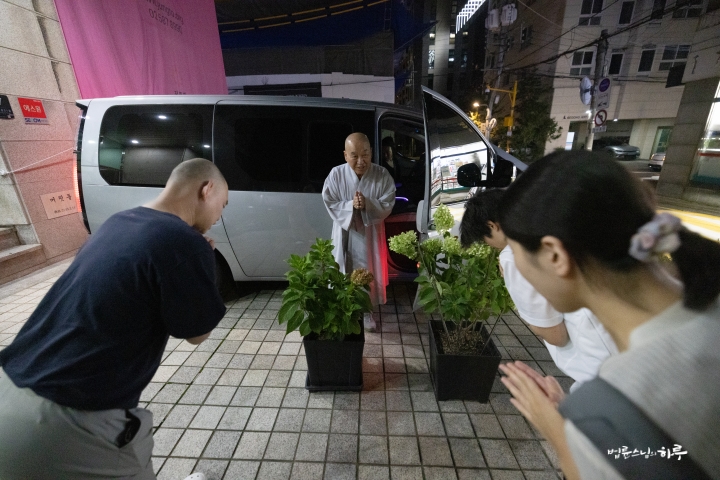
“Sunim, have a safe and healthy journey.”
“Yes, I’ll have a good trip.”
After arriving at Incheon Airport and completing departure procedures, Sunim worked on manuscript editing and business matters at the boarding gate before departing for London, UK at 10:25 PM.
Tomorrow, he will travel via Amsterdam and arrive in London. In the afternoon, he will meet with a publisher to discuss publishing his book “Happiness” in the UK, and in the evening, he will give a Dharma Q&A lecture for Korean residents in London as the first stop of his European lecture tour.





